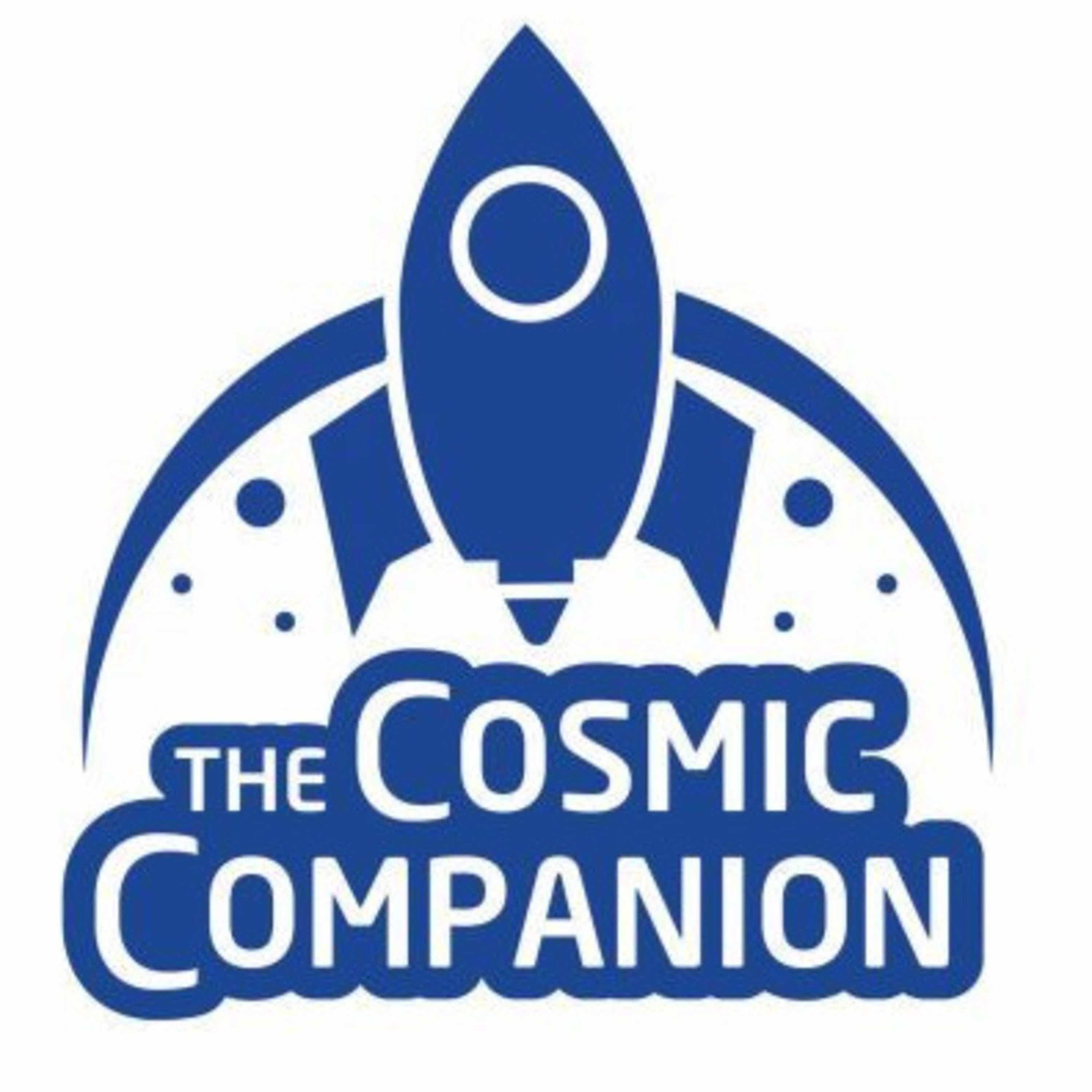
209 episodes


Welcome back to . I’m James G. Maynard. This week, we take the first of two looks at the upcoming solar eclipse coming on 8 April. Later in the show, we will be talking with noted physicist, mathematician, and developer Stephen Wolfram about his new book, . From ancient fears and superstitions to modern-day scientific predictions, the history of eclipse forecasting is a captivating tale of human curiosity and ingenuity. Have you ever looked up at the sky during an eclipse and wondered how people in the past reacted to this awe-inspiring sight? Admit it. I know you have! This is a public episode. If you’d like to discuss this with other subscribers or get access to bonus episodes, visit thecosmiccompanion.substack.com/subscribe https://thecosmiccompanion.substack.com/subscribe?utm_medium=podcast&utm_campaign=CTA_2
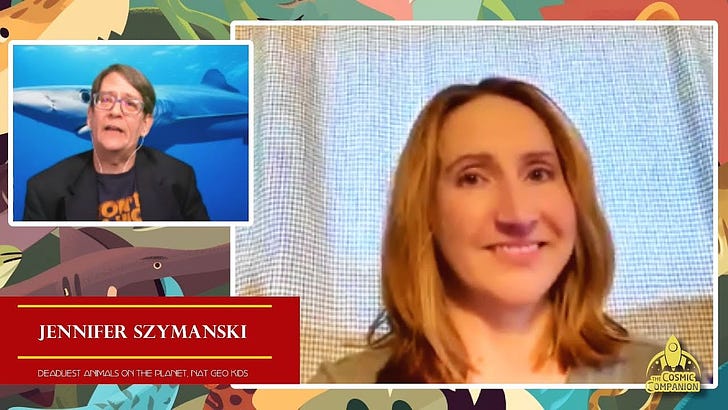

Hello Everyone! Welcome back to . This week, we’re talking about , and what they can teach us about staying alive in space! In a little bit, we’re going to be talking with Jennifer Szymanski from Nat Geo Kids about their new book, . But first, the boring bit of the show with me in it... This is a public episode. If you’d like to discuss this with other subscribers or get access to bonus episodes, visit thecosmiccompanion.substack.com/subscribe https://thecosmiccompanion.substack.com/subscribe?utm_medium=podcast&utm_campaign=CTA_2
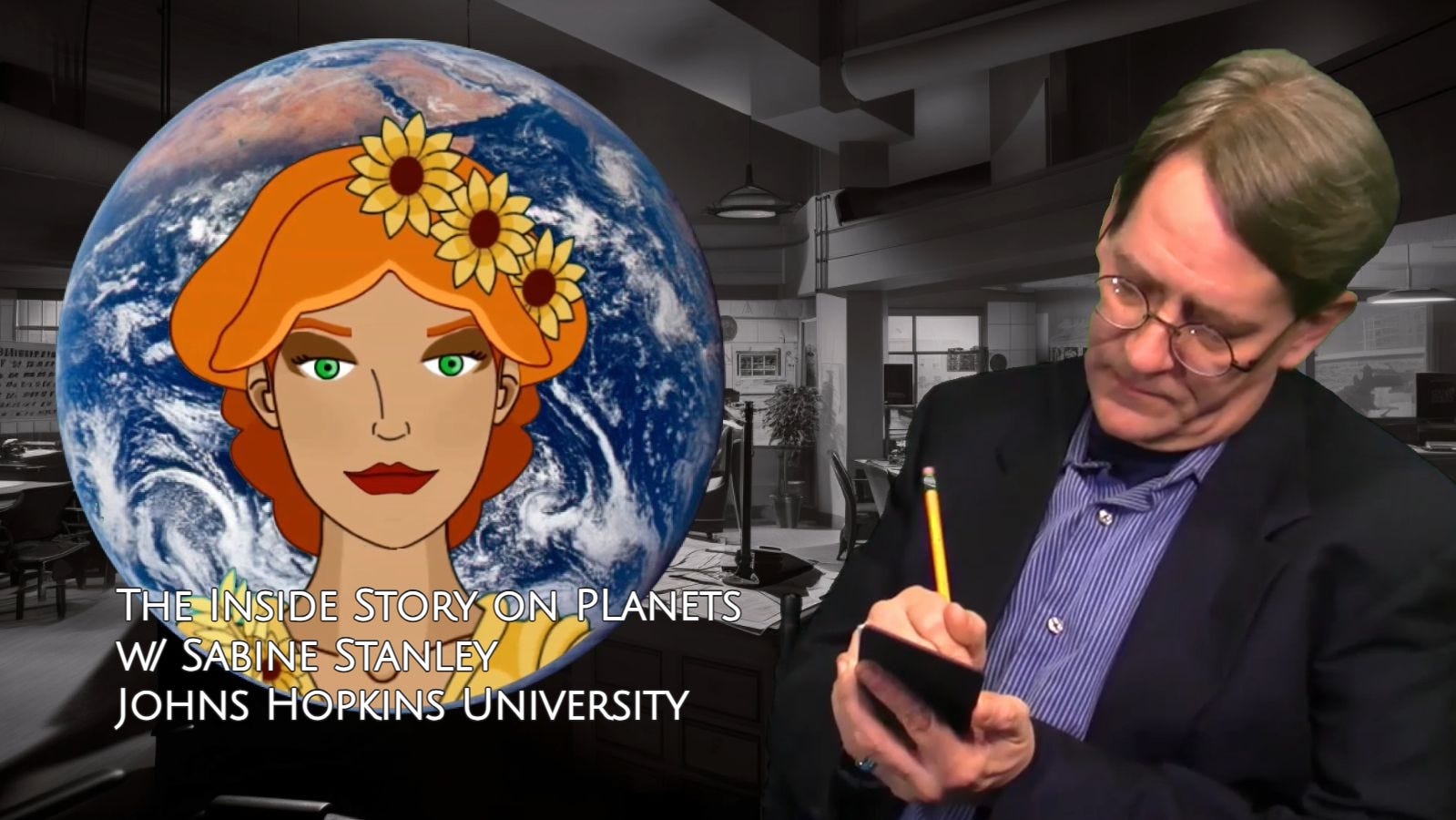

We get the inside scoop on planets from famed 1940s space reporter James G. Maynard, talking with the planets themselves, together with Sabine Stanley of Johns Hopkins University. Get full access to The Cosmic Companion w/ James Maynard at thecosmiccompanion.substack.com/subscribe https://thecosmiccompanion.substack.com/subscribe?utm_medium=podcast&utm_campaign=CTA_4
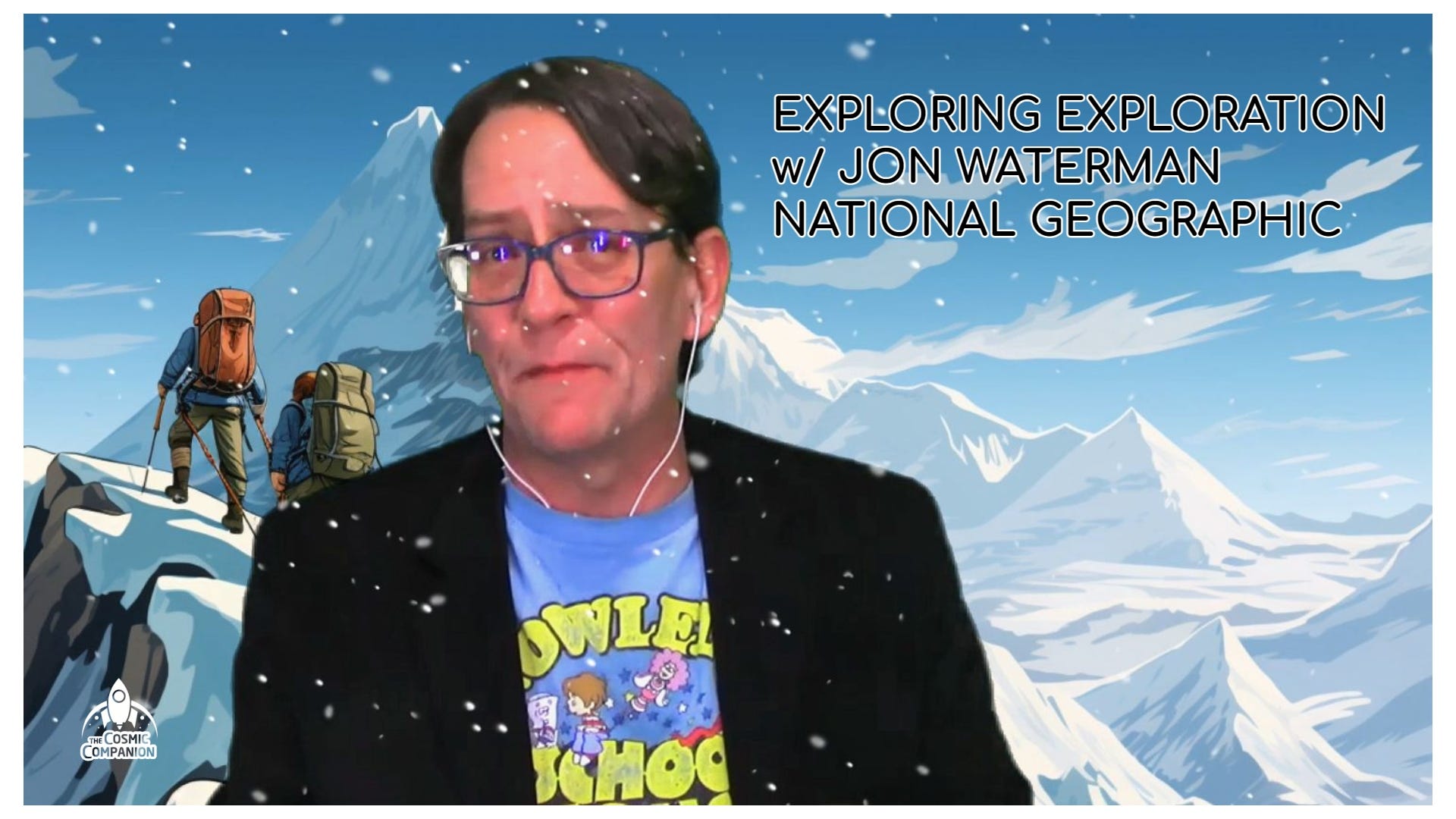

Hello everyone! This week on The Cosmic Companion, we explore exploration, exploring the human need to… explore. Later in the show, we’ll be talking with Jon Waterman, creator of Atlas of Wild America from National Geographic. From the dawn of time, humans have been driven by a primal urge: the need to explore. This innate curiosity has shaped our history, propelling us from the confines of caves to the vast expanse of our planet, and beyond. Let’s take a detour down memory lane. Somewhere between 75,000 and 50,000 years ago, a group of mobile Homo sapiens decided to take humankind’s first road trip out of Africa. Even without roads. Talk about wanderlust! This migration wasn’t just a change of scenery — it resulted in a monumental shift for our species, shaping human evolution. And who could forget the Ancient Greeks and Phoenicians? They were among the original sea-faring explorers, navigating the Mediterranean long before GPS and Google Maps. Wait. [HOLD EARBUD] I’m getting a notification that we have a surprise guest on the show this week. Yes, (is this real? are you sure, Max? Wow. Ok.) Everyone, in a special chronophone interview from 330 BCE, please welcome famed navigator, astronomer, and all-around curious fellow, Pytheas. — χαίρετε! Name’s Pytheas. I’m just your average merchant from Massilia… what? Oh, it’s somewhere in what you would call the Provence region of southern France Anyway, I’ve always had this thing for stories. The wilder, the better. [FULL OPEN] More than 23 centuries before your time, I heard tales of mythical lands, strange creatures, and seas that stretch beyond the horizon. Most folks just dismissed them as sailor’s yarns. No, no. That’s a thing. You’d be surprised how many sailors enjoy macrame… But me? Hearing these stories, I thought, “Why not go check out these legends for myself?” So, I packed my bags and set sail. Now, let me tell you, sailing the Mediterranean is a piece of honey cake. But the Atlantic? That’s a whole different kettle of fish. Literally. The fish are different. Heh heh. Fish… Anyway, there I was, circumnavigating the land you call Britain, or as it went by in its youth, Britannia. I always had a knack for astronomy, and I even figured out the North Star isn’t exactly north. Also, I realized that the Moon plays a role in tides. Good to know when you’re spending months or years at sea. But I wasn’t on the boat all the time. I also got to walk around parts of Britannia, including the legendary tin mines of Cornwall. The people there call themselves the Briton Celtics. I didn’t even know they played basketball. But, up north, the real highlight was the midnight sun. Imagine this: it’s the middle of the night, but the sun is still shining brightly. Great for getting more science done, if not for sleeping outdoors. So there you have it. I’m just a regular guy on an extraordinary journey. Not only did I prove legends of northern Europe true, but I also wound up with a good story or two to tell. Any idea where I can hitch a ride on a rocket? — Maritime voyages of Ancient Greeks and Phoenicians not only expanded their trade routes but also led to advancements in astronomy, geography, and navigation. Talk about making waves! Then there was Marco Polo, the original globetrotter. [ARE WE TALKING BASKETBALL AGAIN?] His travels to Asia were like the ultimate vacation slideshow, except instead of awkward family photos, he brought back tales of exotic lands and cultures that blew everyone’s medieval minds. [MARCO POLO: Dude. I LITERALLY hung out with Kublai Kahn in Xanadu. No way you’re going to top that!] And let’s not forget about those brave souls who dared to explore the icy wilderness of Antarctica and the towering heights of Mt. Everest. These explorers faced harsh conditions and extreme dangers, but their spirit of adventure and discovery pushed them forward. Their journeys expanded our understanding of these remote places, while testing the limits of human endurance. Fortunately for us all, not all exploration is that strenuous, or hazardous. Next up on The Cosmic Companion, we welcome Jon Waterman from National Geographic to the show. We’ll be discussing the human drive to explore, and his new . Fast forward to the 20th century, and our thirst for exploration led us to the final frontier: space. The Apollo missions were like an interplanetary camping trip — with fewer s’mores and more moon dust. When Neil Armstrong set foot on the moon in 1969, it was a giant leap not just for mankind, but for our collective spirit of discovery. As we look to the future in the 21st Century, the spirit of exploration continues to thrive. With advancements in technology, we’re not just exploring physical spaces but also virtual ones. The rise of virtual and augmented reality technologies, together with artificial intelligence, has opened up new frontiers for exploration, allowing us to experience places and ideas in ways previously unimaginable. As we stand on the precipice of a new era in space exploration — with missions to Mars and beyond on the horizon — we are reminded that exploration is not just about reaching new frontiers but also about pushing our limits and striving for a better understanding of our place in the universe. As we explore the depths of our oceans, the vastness of space, and virtual worlds — we carry with us this indomitable spirit of curiosity. Our future may lie in the words of J.R.R. Tolkien, who said, “Not all those who wander are lost.” So go ahead, pack your bags (don’t forget your towel!) [TOWEL], and let’s set off on our next adventure, becoming a better, wiser, species than we were before we took our first steps away from the familiar. Because at its core, that’s what exploration is all about. The Cosmic Companion is starting the first half of our winter break, taking three weeks off. After all the dumb jokes and crazy costumes this year, we need it! We will come back on 2 December, getting , talking with physicist Sabine Stanley from Johns Hopkins University. We’ll be discussing her new book, Make sure to join us then. If you enjoyed this episode of The Cosmic Companion, please download, follow, share, send large sums of money to us, like, and comment on our show. Have a great Thanksgiving and we will see you all on 2 December. Bring a plus one. Clear skies! James The Cosmic Companion w/ James Maynard is a reader-supported publication. To receive new posts and support my work, consider becoming a free or paid subscriber. COLD OPEN: Oh, great. 21st-Century Earth. Smells like… [sniff-sniff] humans. [“Wow, a real-life space chimp!”] Yes, yes, marvel at the space chimp. I’m not here for your amusement, you know! [‘I gotta get a selfie with you!’] What is this with you humans and your social media? [CARS WHIZZ BY] This must be what they call a “rat race.” I know rats, and they would never create this sort of society. It’s like humans are in a never-ending hurry to… well, I’m not quite sure why they’re in a hurry. [Are you here to take over?] Take over? Why would I want to take over this mess? This world would be a much better place if everyone just watched The Cosmic Companion, you know! [What are your future plans?] If I ever get back to my own time, I’m going to become a sci-fi filmmaker. I’ll create a film called … Action! Get full access to The Cosmic Companion w/ James Maynard at thecosmiccompanion.substack.com/subscribe https://thecosmiccompanion.substack.com/subscribe?utm_medium=podcast&utm_campaign=CTA_4


HAPPY HALLOWEEN EVERYONE! (I mean, BOO!) This week on The Cosmic Companion, for our Halloween Special, we’ll be looking at Later in the show, we’ll be talking with astrophysicist and science educator Ethan Siegel, host of ! Get full access to The Cosmic Companion w/ James Maynard at thecosmiccompanion.substack.com/subscribe https://thecosmiccompanion.substack.com/subscribe?utm_medium=podcast&utm_campaign=CTA_4
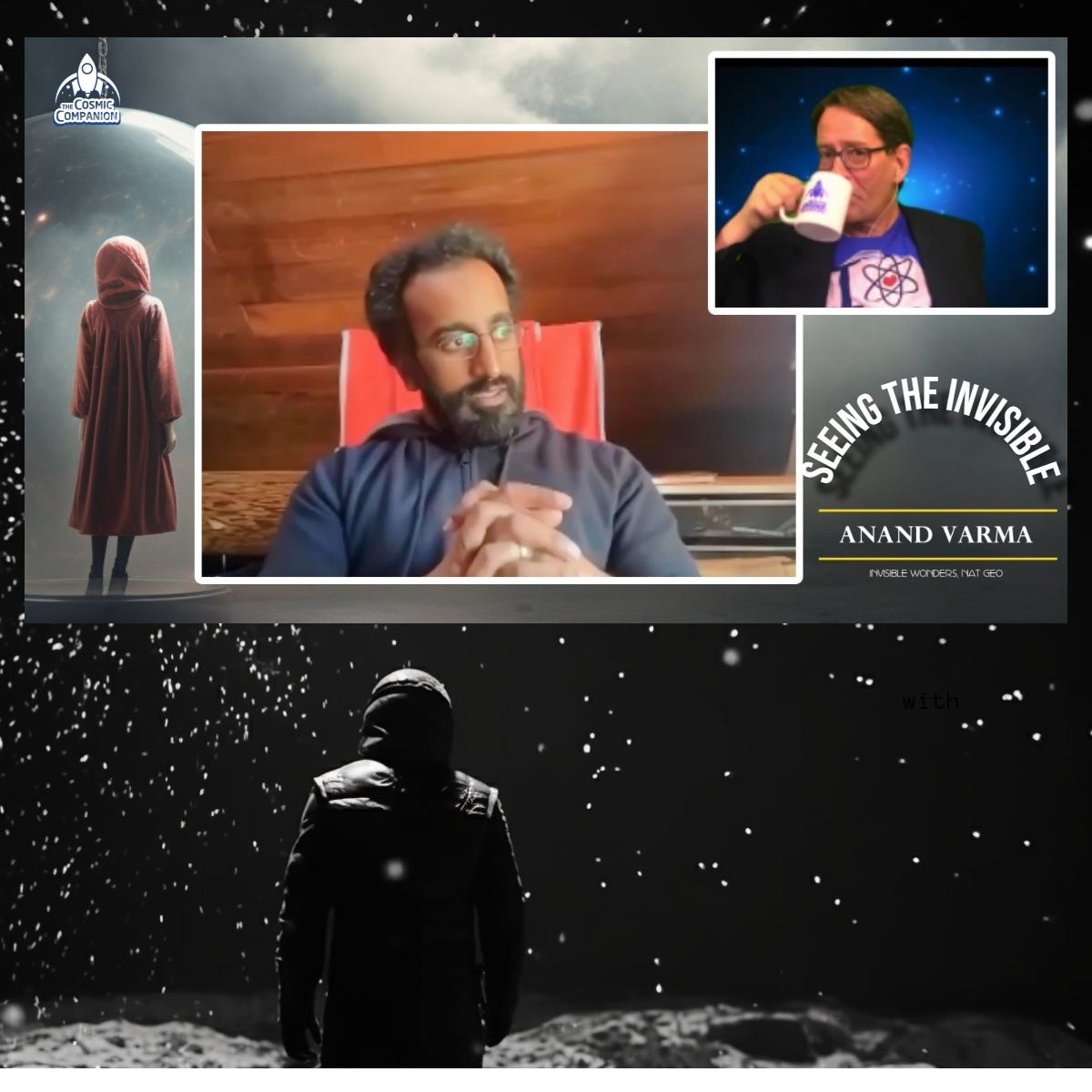

Hello Everyone! This week on The Cosmic Companion, we are . We’ll be discussing how astronomers study objects in space which are invisible to the human eye. Later on, we will be talking with Anand Varma, creator of a new book, , from National Geographic. Get full access to The Cosmic Companion w/ James Maynard at thecosmiccompanion.substack.com/subscribe https://thecosmiccompanion.substack.com/subscribe?utm_medium=podcast&utm_campaign=CTA_4
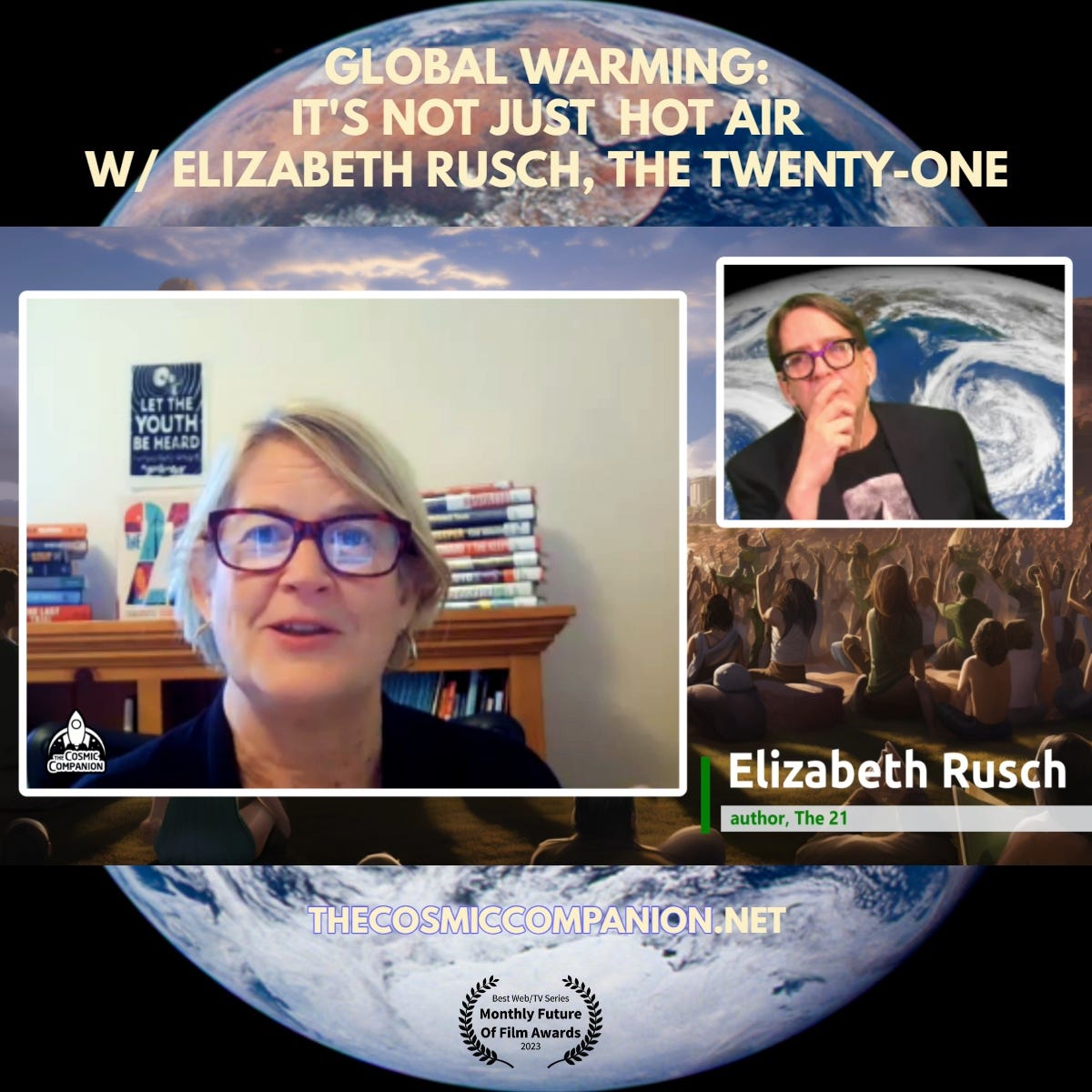

Global warming and climate change is happening all around us. We look at the science of climate change, talking with Elizabeth Rusch, author of The 21. --- This week on The Cosmic Companion, we look at Global Warming - It's Not Just Hot Air! We will be talking with Elizabeth Rusch, author of The 21. Climate change, the ultimate uninvited guest, has been making itself quite comfortable lately. It's like that distant cousin who shows up unannounced, cranks up the heat, and then leaves the door open. The science behind global warming is as fascinating as it is concerning. Since the Industrial Revolution, we've been burning fossil fuels like a barbecue at a Texas tailgate party, releasing greenhouse gases into the atmosphere... Get full access to The Cosmic Companion w/ James Maynard at thecosmiccompanion.substack.com/subscribe https://thecosmiccompanion.substack.com/subscribe?utm_medium=podcast&utm_campaign=CTA_4
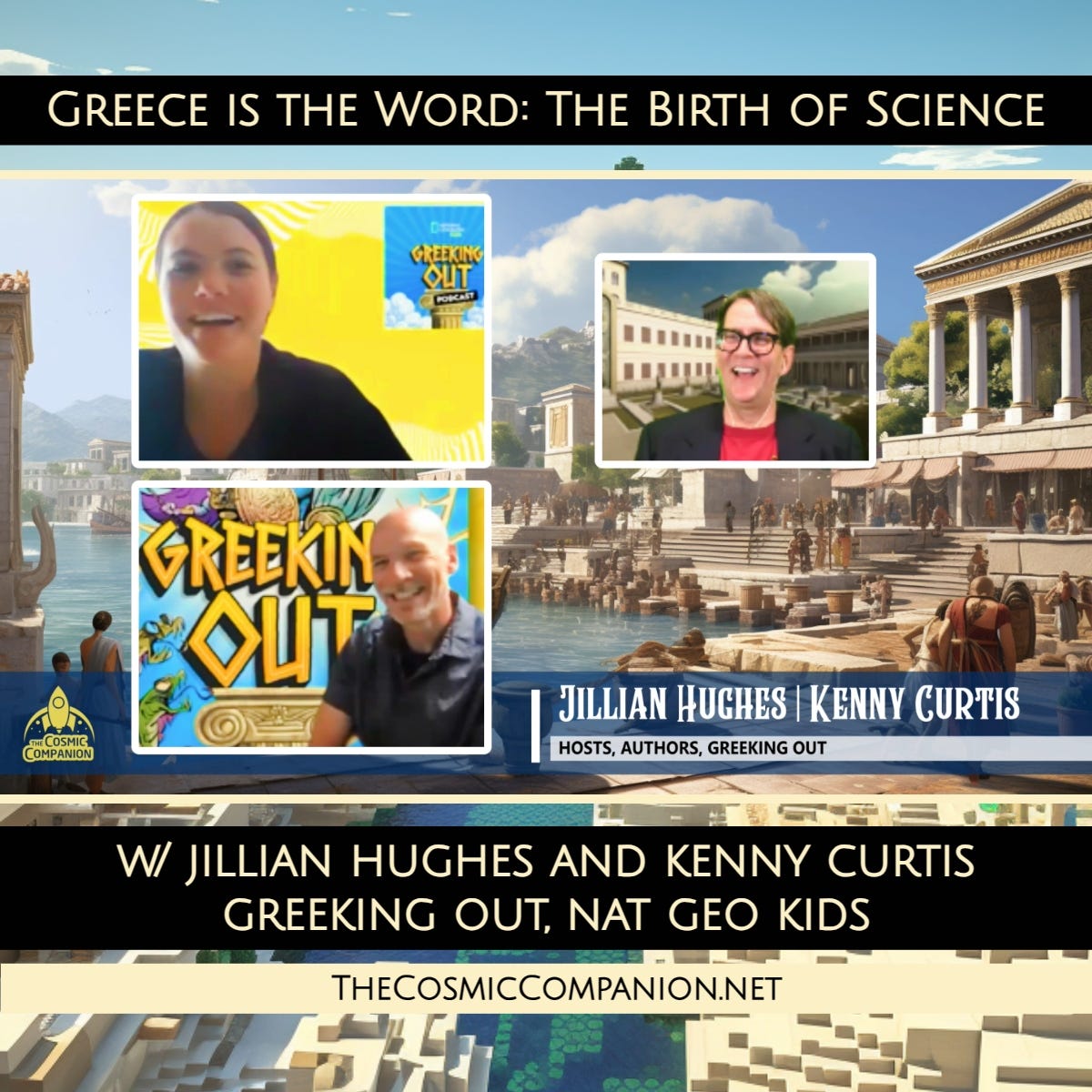

Hello everyone! This week on The Cosmic Companion, we are pondering why Greece is the Word, discussing the birth of science in the ancient world, and what it means for us today. Later on, we'll be talking with Kenny Curtis and Jillian Hughes, hosts of the Greeking Out podcast, and authors of a new book of the same name, from Nat Geo Kids. Once upon a time, in the sunny lands of Ancient Greece more than 25 centuries ago, a bunch of curious folks decided to ask some big questions. "Why does the sun rise?" "What are stars?" "Why do planets move?". They were tired of attributing everything to the whims of gods. Much like overgrown toddlers, they wanted ANSWERS, and they wanted them NOW! (errr… then)... The Greeks had a knack for asking questions that were way ahead of their time. More than 2,500 years before our age, a woman named Aspasia was known for holding gatherings of some of the greatest minds of her day, including Plato and Socrates. A gifted conversationalist, tales tell that she founded a school for girls, a groundbreaking advance for the era. Democritus of Abdera had the crazy idea that all matter was composed of individual bits, which we call atoms. Building on the work of his mentor, one day around 425 BCE, he may have just been walking around, minding his own business when he thought, "What if everything is made up of tiny, invisible particles?" Boom! The concept of atoms was born. Then there was Pythagoras who had a thing for triangles. He may have been sitting around one day, doodling triangles in the sand when he realized that the square of the hypotenuse (the side opposite the right angle) is equal to the sum of the squares of the other two sides. Mind blown! And thus, the Pythagorean theorem came into existence. During the 4th Century BCE, Hippocrates took one look at medicine and said, "This needs some work." [Not my words exactly, but… Yeah, sure.] He insisted that diseases were not punishments from angry gods but had natural causes that could be studied and treated. This revolutionary idea paved the way for modern medicine. Not long after, Agnodice of Athens practiced medicine dressed as a man, at a time when women were not allowed to be doctors. Thanks to her, laws in Athens preventing women from becoming doctors were overturned. [AGN: You're welcome!] But it wasn't all work and no play for these ancient scientists. Legend has it that Archimedes discovered his principle while taking a bath. He noticed that the water level rose as he got into his tub and realized this could be used to determine volume. He was so excited that he ran through the streets naked shouting "Eureka!" (which means "I found it!"). Now that's what I call a eureka moment! The birth of science in ancient Greece is a story of curiosity, ingenuity and occasional naked sprinting through the streets. The ancient Greeks might not have had all the answers, but they sure knew how to ask interesting questions! With questions come answers, and for a few of each, we're talking with Jillian Hughes and Kenny Curtis about their new podcast and book, Greeking Out, from Nat Geo Kids. --- Now. Let's talk about our friend Pythagoras. Remember him? The triangle guy? Well, his theorem is still used today in everything from architecture to video games. Yes, you heard it right! Every time you play a game of Fortnite or Minecraft, Pythagoras is there, making sure everything looks just right. Next up is Hippocrates, the father of modern medicine. His idea that diseases have natural causes was a game-changer. Today, doctors across the globe follow his principles. So, the next time medicine helps you out, remember to say a silent thank you to Hippocrates (but maybe skip on the leeches and bloodletting). And who could forget Archimedes? His principle helps us design ships and submarines. And yes, he's also the reason why your bathwater rises when you get in. So, the next time you're enjoying a relaxing bath, spare a thought for Archimedes (and maybe keep your "Eureka!" moment to yourself). Last but not least, Democritus' atomic theory is at the heart of modern physics and chemistry. It's why we can build everything from skyscrapers to smartphones. So every time you send a text or take a selfie, remember that it's thanks, in part, to a Greek guy who lived over 2000 years ago. So there you have it! The Ancient Greeks might be long gone, but their discoveries are still very much alive and kicking. It just goes to show that great science never goes out of style! Next week on The Cosmic Companion, we look at Global Warming: It's Not Just Hot Air!. We'll look at the science of climate change, and how our world could change in the coming decades. We'll be talking with Elizabeth Rusch, author of The Twenty-One, telling the story of a group of young people using the legal system to help reverse climate change. Make sure to join us, starting on 14 October, anywhere you see or hear The Cosmic Companion. While you are there, go ahead and do all that sharing and subscribing stuff. It'd be pretty cool if you did. Yup. Pretty cool indeed… Clear skies! --- [COLD OPEN] So this is the future. Interesting. Well, good evening, everyone! I must say, when I was told I'd be time-traveling, I expected to see the future of Greece, not to land in 'Grease.' However, I am not entirely to blame, by Jove! Here are "The Top 10 Reasons I Thought Grease was Greece:" #10 When my agent said he booked me on a tour of Grease, I thought he said Greece. A natural mistake. #9 I thought I saw young people in togas and a group of Spartan warriors. It turns out they were wearing "poodle skirts" and "leather jackets." #8 All the spontaneous singing and dancing made me think I was near a Greek theatre. #7 I saw chariots without horses. I'm a scientist. Studying those was just natural. #6 One of the horseless chariots had lightning bolts on it. I naturally believed it to be a chariot of Zeus. [ZEUS APPEARS No. Not me. I wouldn't drive anything that ostentatious. FADE] #5 The sight of people eating in a diner reminded me of symposiums, though I have been told that wine has been replaced with milkshakes. Those are pretty good, honestly. Have you ever tried a flavor called "chocolate?" #4 Hearing about a beauty school dropout, and seeing a woman surrounded by other women in pink, I naturally believed them to be Aphrodite and her priestesses. She still owes me 10 drachma. #3 Watching a dance-off at the local gymnasium made me think of athletic competitions in Ancient Greece. Plato would have loved it. #2 Coming across what I thought was an open-air play, it turned out to be something called a "drive-in movie." I think those are going to be pretty popular in a few decades. #1 And, the NUMBER ONE REASON I Thought Grease was Greece is… [DRUM ROLL] Seeing this teenage drama unfold, I mistook it for a Greek tragedy. OK. I'm ready to go back. Send James Maynard in, already… [FADE. OFF SCREEN: -unintelligible- What do you MEAN the chariot flies? That's ridiculous. ]Clear skies! James The Cosmic Companion w/ James Maynard is a reader-supported publication. To receive new posts and support my work, consider becoming a free or paid subscriber. Get full access to The Cosmic Companion w/ James Maynard at thecosmiccompanion.substack.com/subscribe https://thecosmiccompanion.substack.com/subscribe?utm_medium=podcast&utm_campaign=CTA_4
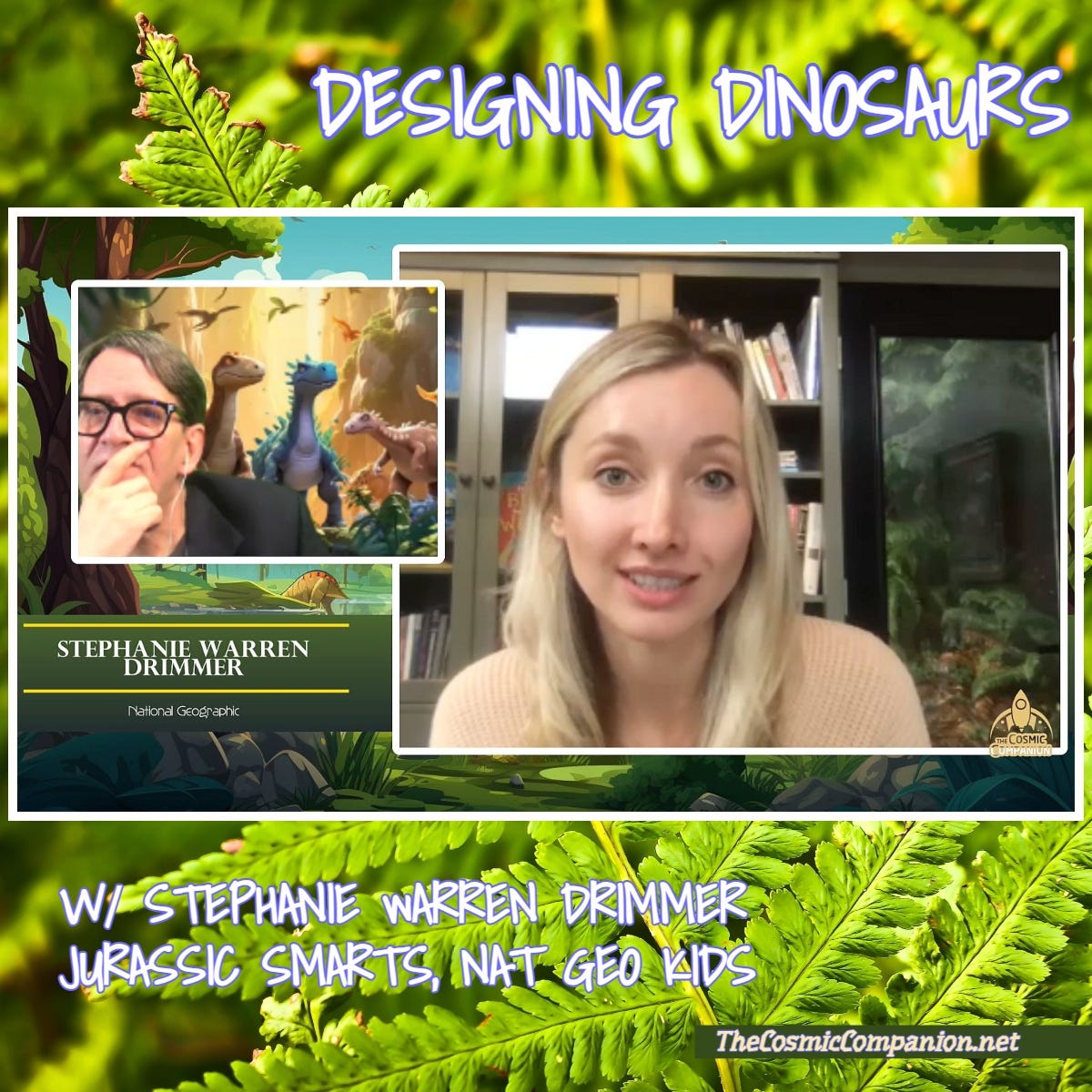

This week on , we look at . How do we know details about dinosaurs that are not readily apparent from the fossil record? How can we tell what we can tell about the colors, sounds, and behaviors of these magnificent little beasties? Later in the show, we are going to talk with Stephanie Warren Drimmer from National Geographic about her new book, . Fossils, including those of dinosaurs, have been known about since ancient times. These findings led to legends of dragons, cyclopseseseses, and at least one odd guess at giant humans... Get full access to The Cosmic Companion w/ James Maynard at thecosmiccompanion.substack.com/subscribe https://thecosmiccompanion.substack.com/subscribe?utm_medium=podcast&utm_campaign=CTA_4
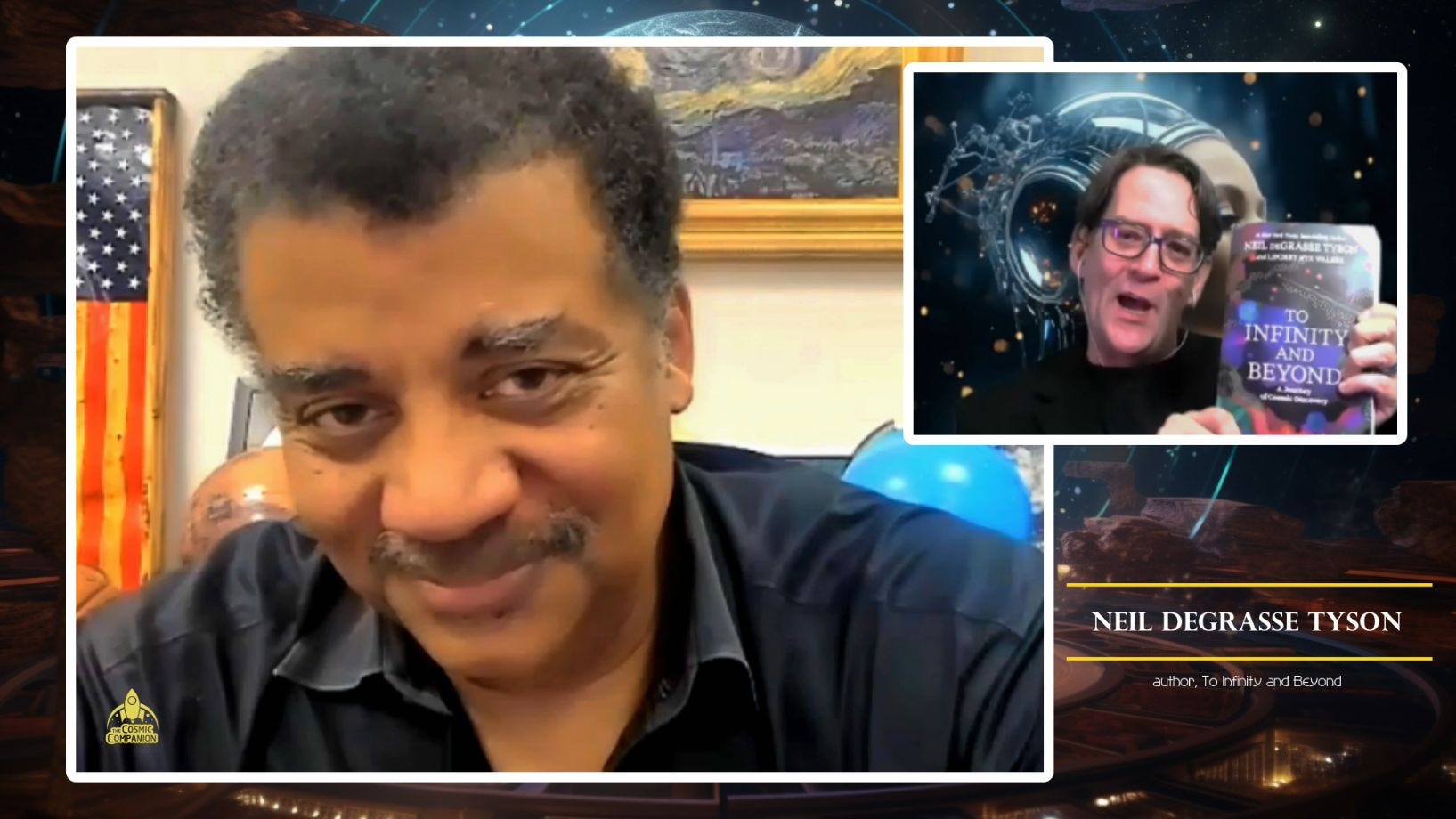

This week on The Cosmic Companion, we’re discussing . Later on, we are talking with one of your species more impressive information processing and dissemination units, Neil deGrasse Tyson. Get full access to The Cosmic Companion w/ James Maynard at thecosmiccompanion.substack.com/subscribe https://thecosmiccompanion.substack.com/subscribe?utm_medium=podcast&utm_campaign=CTA_4
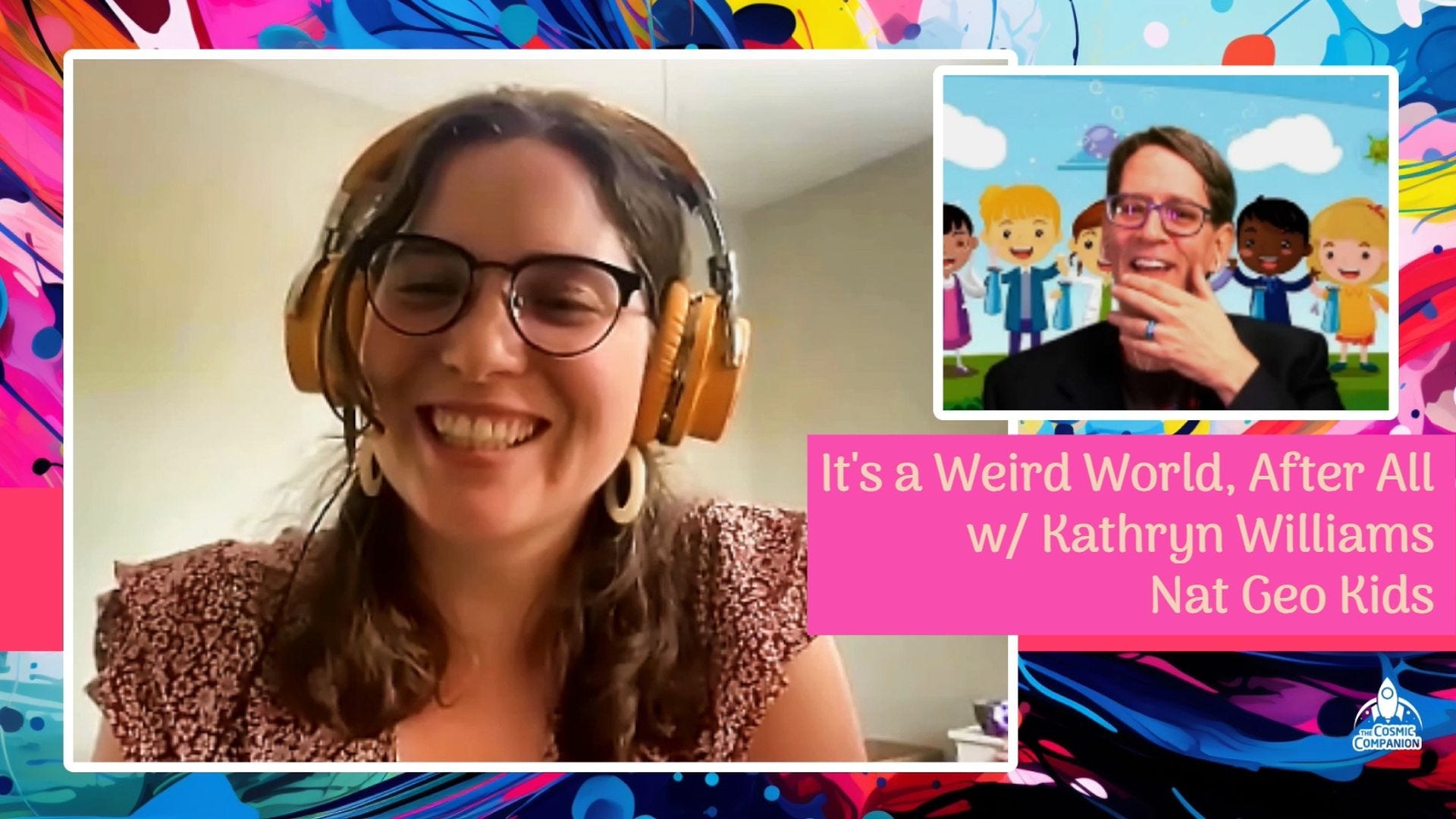

This week on , we’re talking about how ! Later in the show, we’re going to talk with Kathryn Williams about , new from National Geographic Kids! Get full access to The Cosmic Companion w/ James Maynard at thecosmiccompanion.substack.com/subscribe https://thecosmiccompanion.substack.com/subscribe?utm_medium=podcast&utm_campaign=CTA_4
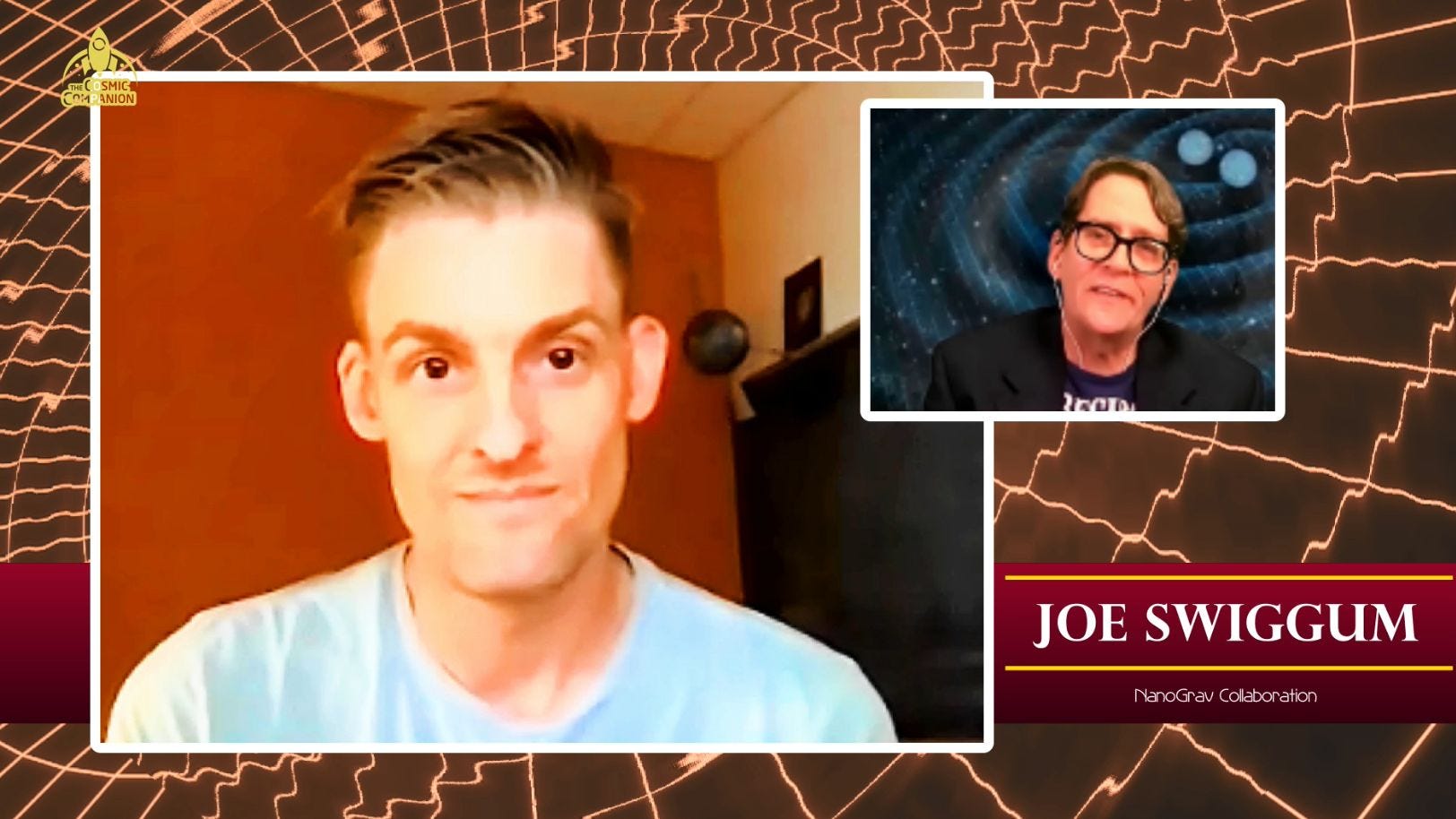

This week on The Cosmic Companion, we take on a weighty subject — gravity. Later in the show, we are going to talk with Joe Swiggum from the NanoGrav Collaboration. Gravity is one of those things that we all know about, but when you really stop to think about it, it’s pretty mind-boggling. I mean, there’s this invisible force that keeps us all stuck to the ground and makes things fall when we drop them. How wild is that? Get full access to The Cosmic Companion w/ James Maynard at thecosmiccompanion.substack.com/subscribe https://thecosmiccompanion.substack.com/subscribe?utm_medium=podcast&utm_campaign=CTA_4
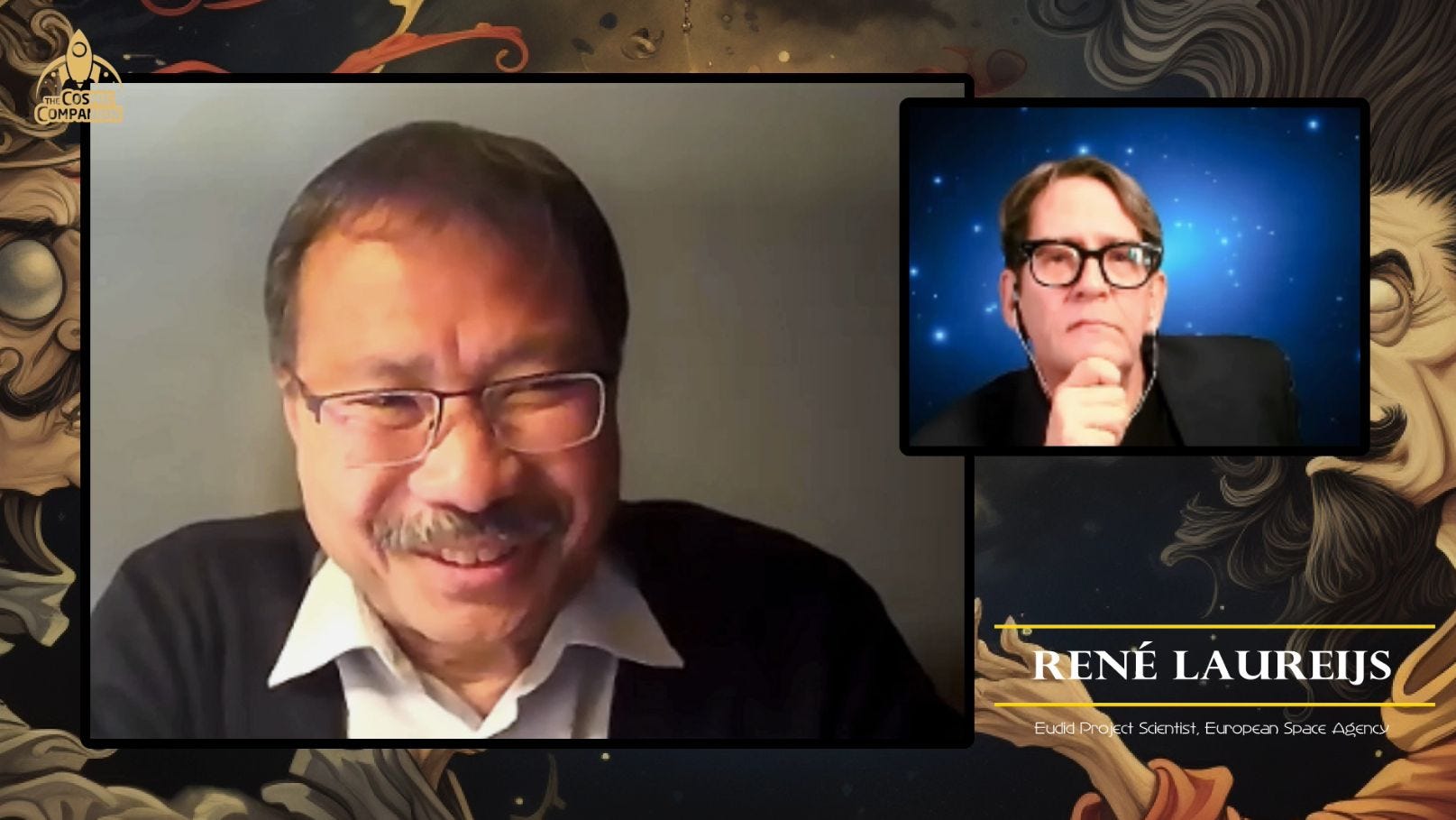

This week on The Cosmic Companion, we talk about the mysteries of Dark Matter and Dark Energy. Later in the show, we will be joined by René Laureijs, Euclid Project Scientist, from The European Space Agency. If one were to look at all the matter and energy in the Universe, about 68% is dark energy, 27% is dark matter, and just five percent is everything we see around us. 95% of everything out there — is totally unknown. [That’s chicken feed. What IS most of the Universe?] Good question! Get full access to The Cosmic Companion w/ James Maynard at thecosmiccompanion.substack.com/subscribe https://thecosmiccompanion.substack.com/subscribe?utm_medium=podcast&utm_campaign=CTA_4
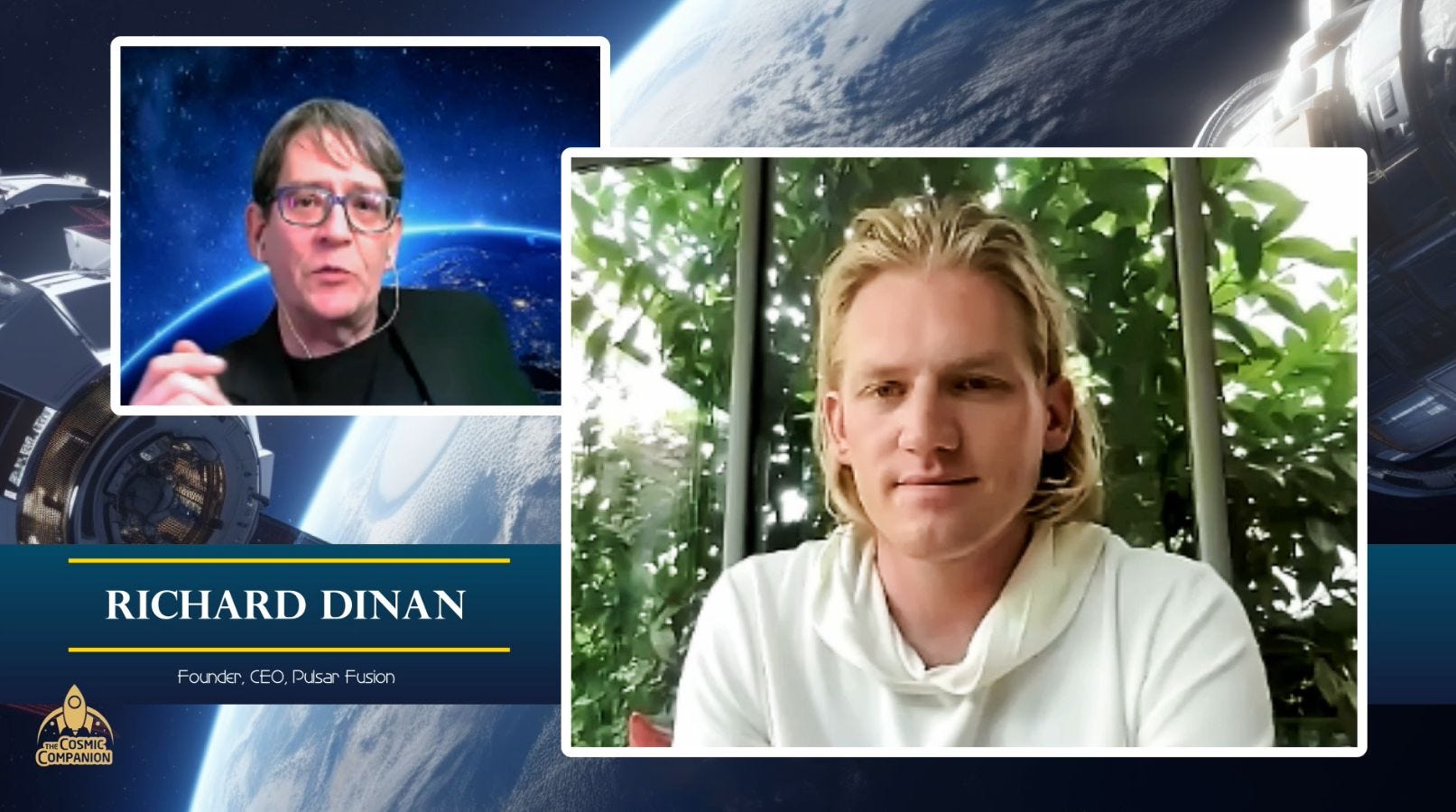

We are back from summer break with an amazing guest, Richard Dinan, founder of Pulsar Fusion (Yeah. The guy from !).Kicking off the second half of our seventh season, we offer you a look at how the human race might take our first steps to becoming an interplanetary species. Later in the show, we will be talking with Richard Dinan, founder and CEO of Pulsar Fusion, about spacecraft powered by nuclear fusion. Neat-O, Wally! Get full access to The Cosmic Companion w/ James Maynard at thecosmiccompanion.substack.com/subscribe https://thecosmiccompanion.substack.com/subscribe?utm_medium=podcast&utm_campaign=CTA_4
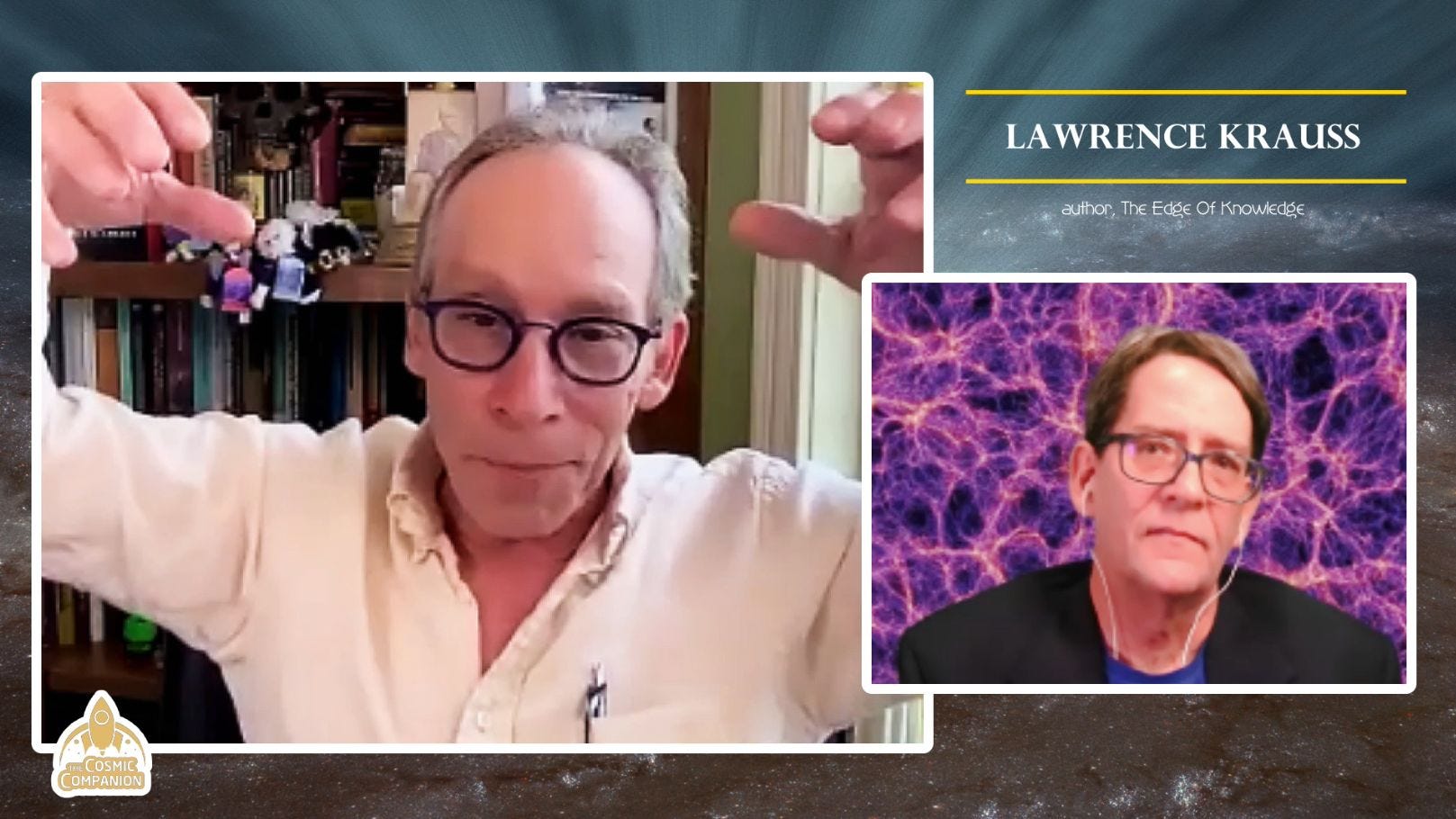

We explore the greatest mysteries of the Universe, from the Big Bang, to black holes, dark matter, dark energy, and more, talking with famed cosmologist and author Lawrence Krauss... Get full access to The Cosmic Companion w/ James Maynard at thecosmiccompanion.substack.com/subscribe https://thecosmiccompanion.substack.com/subscribe?utm_medium=podcast&utm_campaign=CTA_4
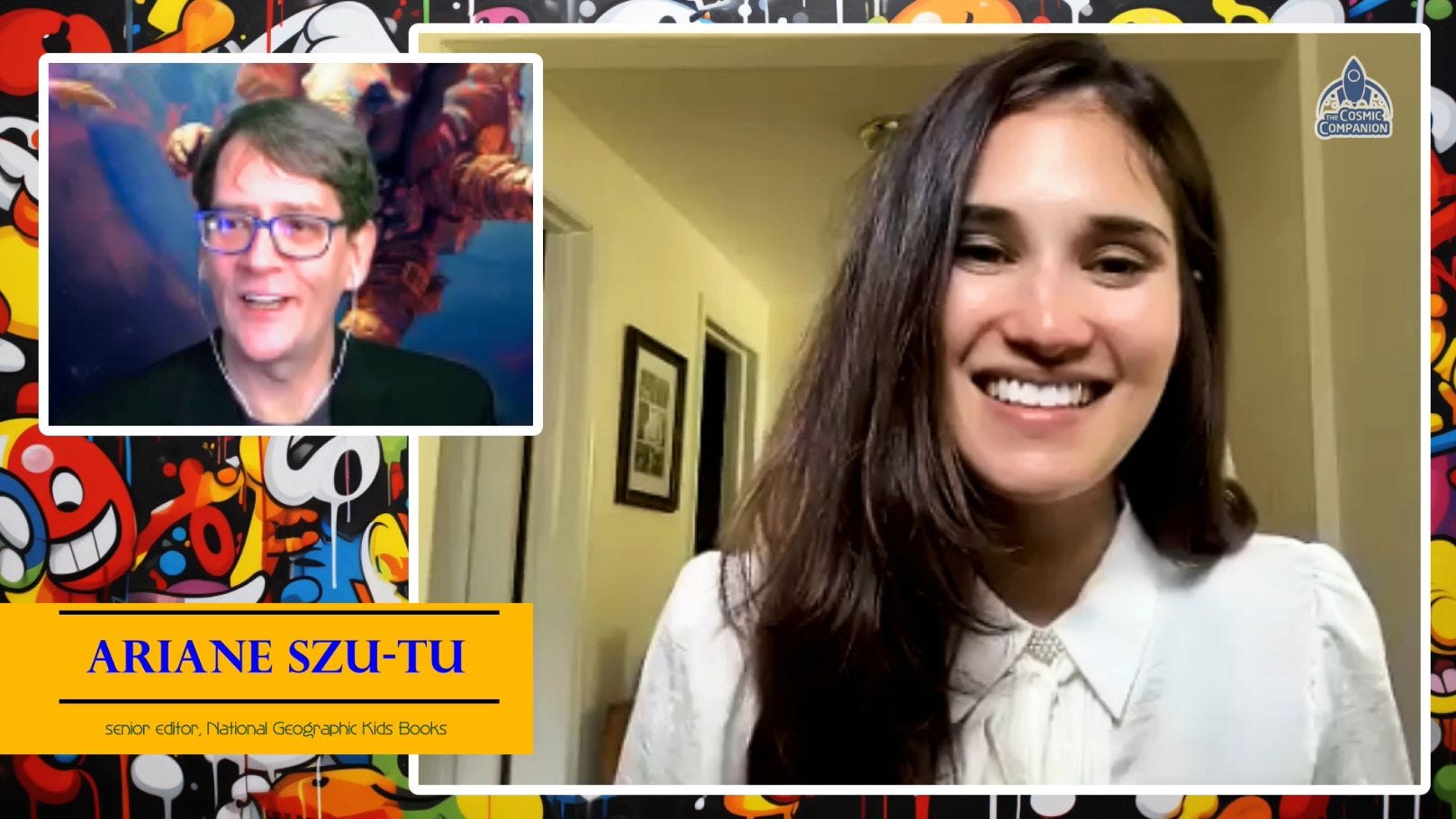

Planting the Seeds of STEAM w/ Ariane Szu-Tu, Nat Geo Kids Exploring STEAM education and learning, with Ariane Szu-Tu, senior editor, National Geographic Kids Books. This week on The Cosmic Companion, we're going to take a wild ride through the exciting and innovative universe of STEAM education. Later in the show, we talk with Ariane Szu-Tu, senior editor at National Geographic Kids Books, about their new release, Almanac 2024! Get full access to The Cosmic Companion w/ James Maynard at thecosmiccompanion.substack.com/subscribe https://thecosmiccompanion.substack.com/subscribe?utm_medium=podcast&utm_campaign=CTA_4
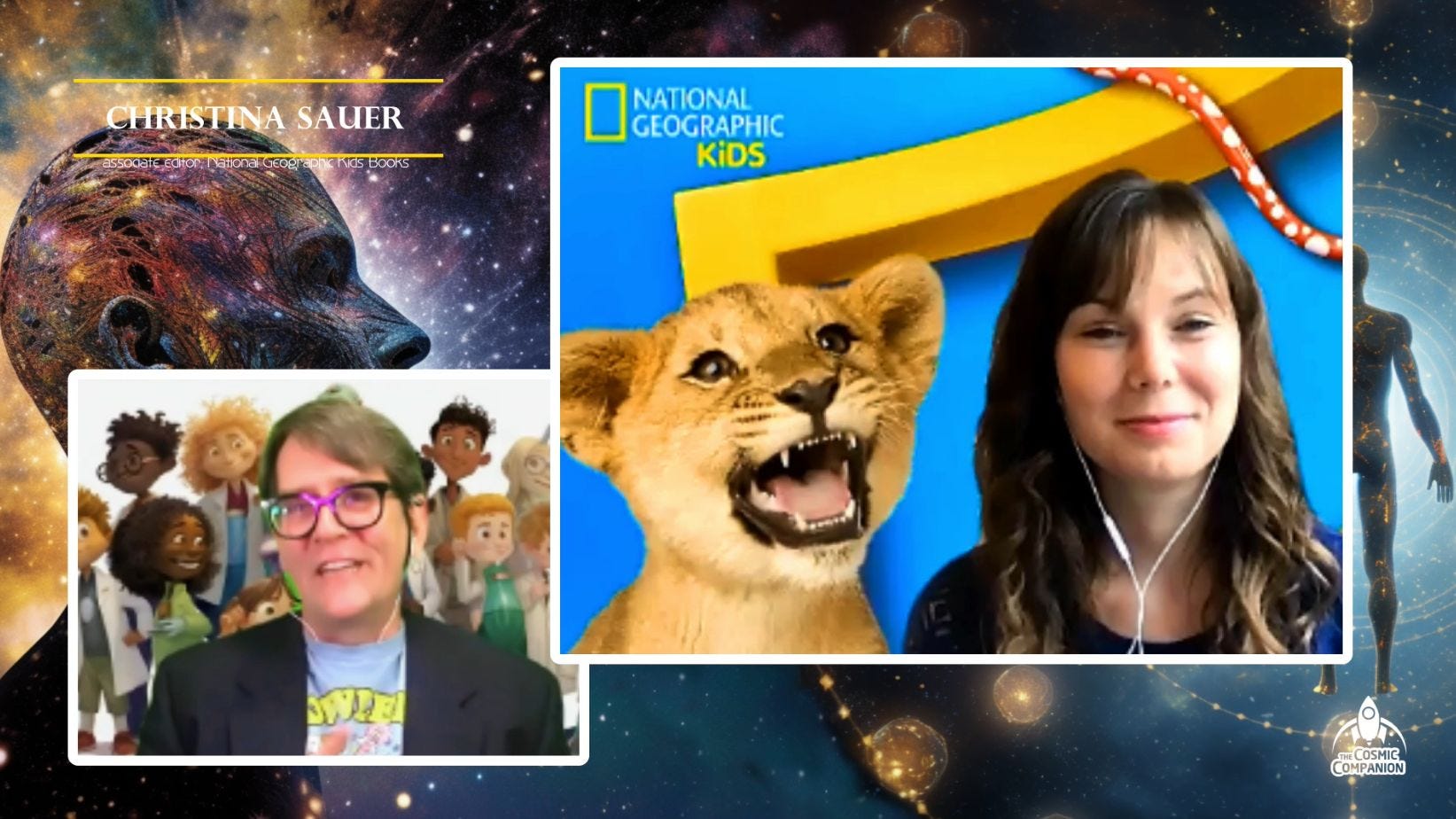

Hello everyone! Welcome back to The Cosmic Companion. I’m James Maynard! This week, we look at the one thing every space traveler will have in common — they will all be Living with a Body in Space. Later in the show, we will be joined by Christina Sauer, Associate Editor for National Geographic Kids, talking about their new release, . Get full access to The Cosmic Companion w/ James Maynard at thecosmiccompanion.substack.com/subscribe https://thecosmiccompanion.substack.com/subscribe?utm_medium=podcast&utm_campaign=CTA_4
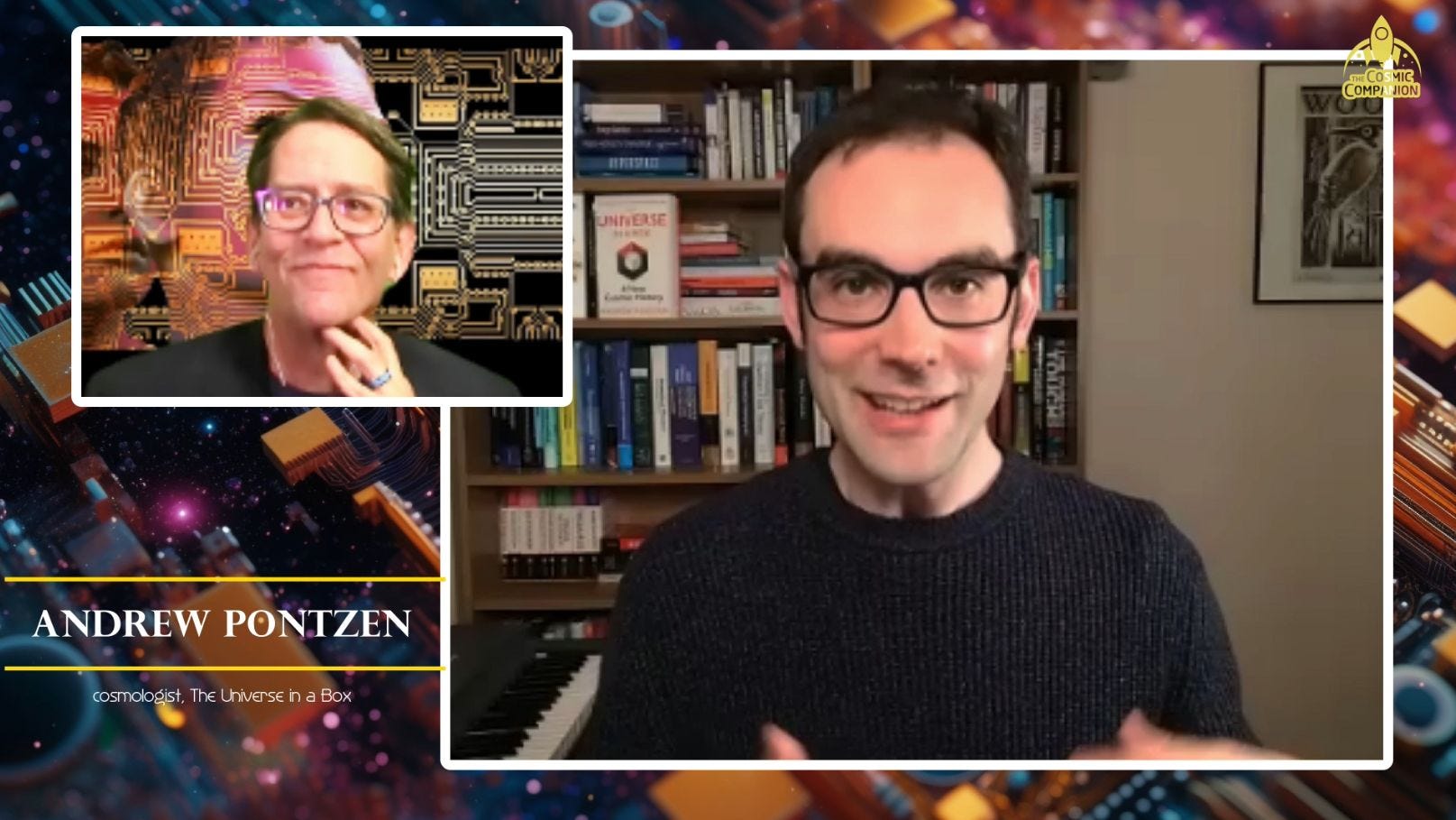

How do we create computer models of the Universe, and how will artificial intelligence revolutionize astronomy? Talking with Andrew Pontzen, author of The Universe in a Box --- This week on The Cosmic Companion, we explore the fascinating world of computer models of the universe! From humble beginnings to mind-boggling simulations, this is the history of how we unravel mysteries of the Cosmos using the power of computers. Astronomers and cosmologists seek to understand what happened billions of years ago, and what may happen billions of years in the future. They explore the mysteries of dark matter, black holes, galaxies, and more. Among their tools are computer models and simulations. Using mathematical equations and data to represent physical phenomena, researchers develop and test their theories about the Cosmos... Get full access to The Cosmic Companion w/ James Maynard at thecosmiccompanion.substack.com/subscribe https://thecosmiccompanion.substack.com/subscribe?utm_medium=podcast&utm_campaign=CTA_4
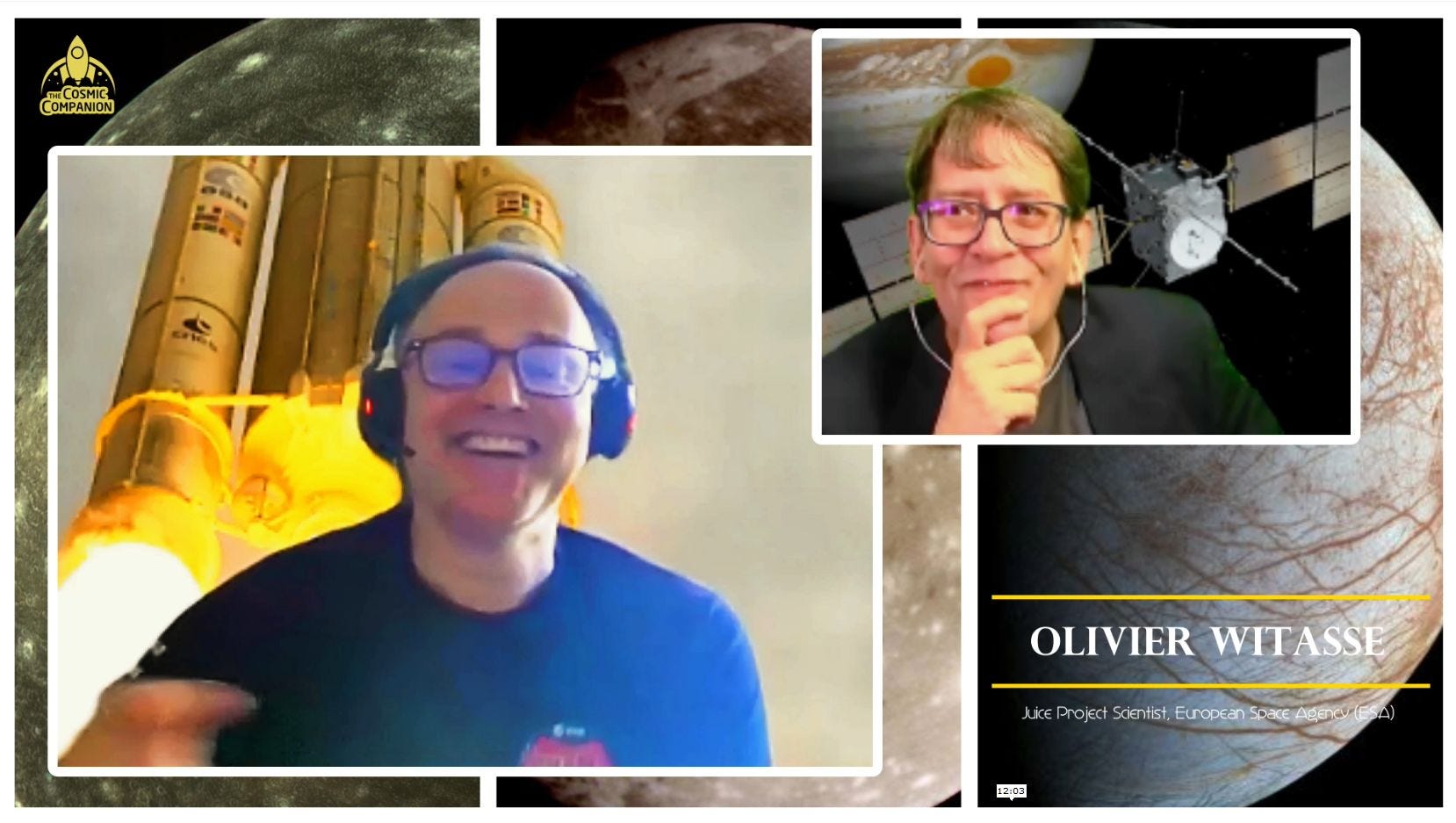

Hello everyone! This week on The Cosmic Companion, we will explore The Water Worlds of the Solar System, talking with Olivier Witasse from the European Space Agency, Project Scientist for the Jupiter Icy Moons Explorer, or Juice, now on its way to the Jovian system. Join me, your trusty celestial tour guide, as we don our intellectual swim trunks and dive into the water worlds of our solar system. Water, essential for all life on Earth, was once thought to be rare in the solar system. Large quantities of water ice are now believed to sit inside deep craters at the poles of the Moon, where sunlight never strikes. Ice deposits at the South Pole of the Moon alone could hold more than 150 times as much water as the Mediterranean Sea. These vast deposits of water mean these regions are where the first human settlements on the Moon will soon rise. But native life seems unlikely inside huge blocks of solid ice billions of years old. [> What is wrong with this guy, seriously? I’ve raised over 674,000 children in this thimble, and they turned out just fine!] Next up is the King of the Planets. Of the 80–95 known moons of Jupiter, three are now believed to house vast oceans of liquid water. Callisto is the most heavily cratered object in our solar system. Once thought to be a dead body, evidence for subsurface oceans was spotted by the Galileo spacecraft in the 1990s. This same craft also found a thin atmosphere of carbon dioxide, similar to the one in Isaac Asimov’s story “The Callistan Menace.” Unlike that story however, giant caterpillars were nowhere to be seen. [___ Dude! I’m right here! Hello! Giant caterpillar!]] {SCRATCH HEAD} Ganymede is larger than the planet Mercury, and it is the only moon known to have its own magnetic field. This behemoth world could also be home to the largest ocean in our family of planets. Bodies of water on Ganymede may stretch 10 times deeper than Earth, buried under 150 kilometers of ice. That’s five times deeper than the average crust of Earth here on Terra Firma. These massive oceans might also be sandwiched between layers of mineral-rich rock, greatly increasing the amount of chemistry happening at the boundaries between water and rock, where life on Earth first took hold. [[VENDOR: Get your Europa sandwich right heah! We got rocks, we got watah! We got little green stuff squirmin’ around dere. And slime! Extra slime! Also, pickles! CUSTOMER: Ewww… Gross! Disgusting! No thanks! Who eats a sandwich with pickles?]] Europa, with an iron core, rocky mantle, and an ocean of salty water… Sound familiar??? [->] …may be the best place in the solar system to search for extraterrestrial life. Oceans here could hold twice as much water as is found on Earth. The surface of this world is covered in water ice, bent and pulled by tidal forces due to gravity from Jupiter. This action breaks the icy surface, and it cracks apart from stress, like every couple by the end of a Paul Simon song. Heat from this process might also help warm the oceans of Europa, increasing hope of extraterrestrial life forming on this distant world. On 14 April, the Jupiter Icy Moons Explorer spacecraft, lovingly known as Juice, lifted off on its way to explore these intriguing moons of Jupiter. Next up, we talk with Olivier Witasse from the European Space Agency, Project Scientist for Juice. — Next up, we head on out to the Ringed Planet. After staring at Saturn’s rings, mouth agape for 22 minutes like James Kirk first seeing the Enterprise in , we turn our sights to two intriguing worlds — Titan and Enceladus. Titan is best-known for having massive oceans of methane and ethane. However, beneath its crust might also lie oceans of liquid water. With hydrocarbons, organic materials, mineral-rich rocks, and water, Titan could be the home of some intriguing chemistry, and perhaps even bizzare forms of life. Enceladus may be small, but it is the Old Faithful of the solar system, spewing forth geysers of water thousands of kilometers into space. These plumes, recently imaged by the James Webb Space Telescope, are infused with the chemical building blocks of life. Whipping around Saturn once every 33 hours, these eruptions from Enceladus form a giant donut of water encircling the planet. Mmm… Giant Water doughnut… Oh! You like geysers, you say! Well, I happen to know where to find some more. What? No, not Yellowstone. well, kinda. But… You know what? Just follow me. OK — Here we are at the most distant full-fledged planet in the solar system (we think!), Neptune. See its largest moon? Yeah, that troublemaker orbiting in the opposite direction from all the other satellites here. That’s Triton. Now, it’s wet and cold on Triton, -235 Celsius on average, pretty much the exact opposite of Arizona. [At least it’s a wet cold!] MMmm… The surface of Triton is covered in active geysers pushing nitrogen gas into space. This world is home to smooth volcanic plains and pits formed by flows of icy lava — a process known as cryovolcanism. Volcanoes of mineral-rich water on Triton turn the landscape into a cross between Ancient Pompeii and Frozen. Finally, we zoom out to the Kuiper Belt, paying a visit to the dwarf planet with a heart, Pluto! Beneath its rocky crust, Pluto is now thought to house a global ocean, which may be 100 kilometers — or more than 11 Mount Everests — deep. Despite the frigid temperatures this far from the Sun, stress from tidal forces between Pluto and its largest moon, Charon, could keep these oceans warm enough to remain liquid, and perhaps even provide enough energy to spark life. Each of these water worlds provides intriguing landscapes, along with geology, chemistry, and physics which could offer us the greatest finding of all time — the discovery of life on other worlds. Next week on The Cosmic Companion, we take a look at efforts at . How do we recreate the Universe in computer simulations, and how will artificial intelligence revolutionize our understanding of the Cosmos? We will be joined by cosmologist Andrew Pontzen, author of . Make sure to join us, starting on 10 June. Head on over to TheCosmicCompanion.com to sign up for our newsletter, and never miss an episode. If you love your science shows informative, entertaining, and at least occasionally funny, where can I find a show like that? It sounds great! Oh, oh… The Cosmic Companion, right. Share and follow us, and let your friends know about the show. Thanks! Clear skies! [[It’s… cold… Awww… Jump on in. The water’s fine once you get used to it.]] James The Cosmic Companion w/ James Maynard is a reader-supported publication. To receive new posts and support my work, consider becoming a free or paid subscriber. Get full access to The Cosmic Companion w/ James Maynard at thecosmiccompanion.substack.com/subscribe https://thecosmiccompanion.substack.com/subscribe?utm_medium=podcast&utm_campaign=CTA_4
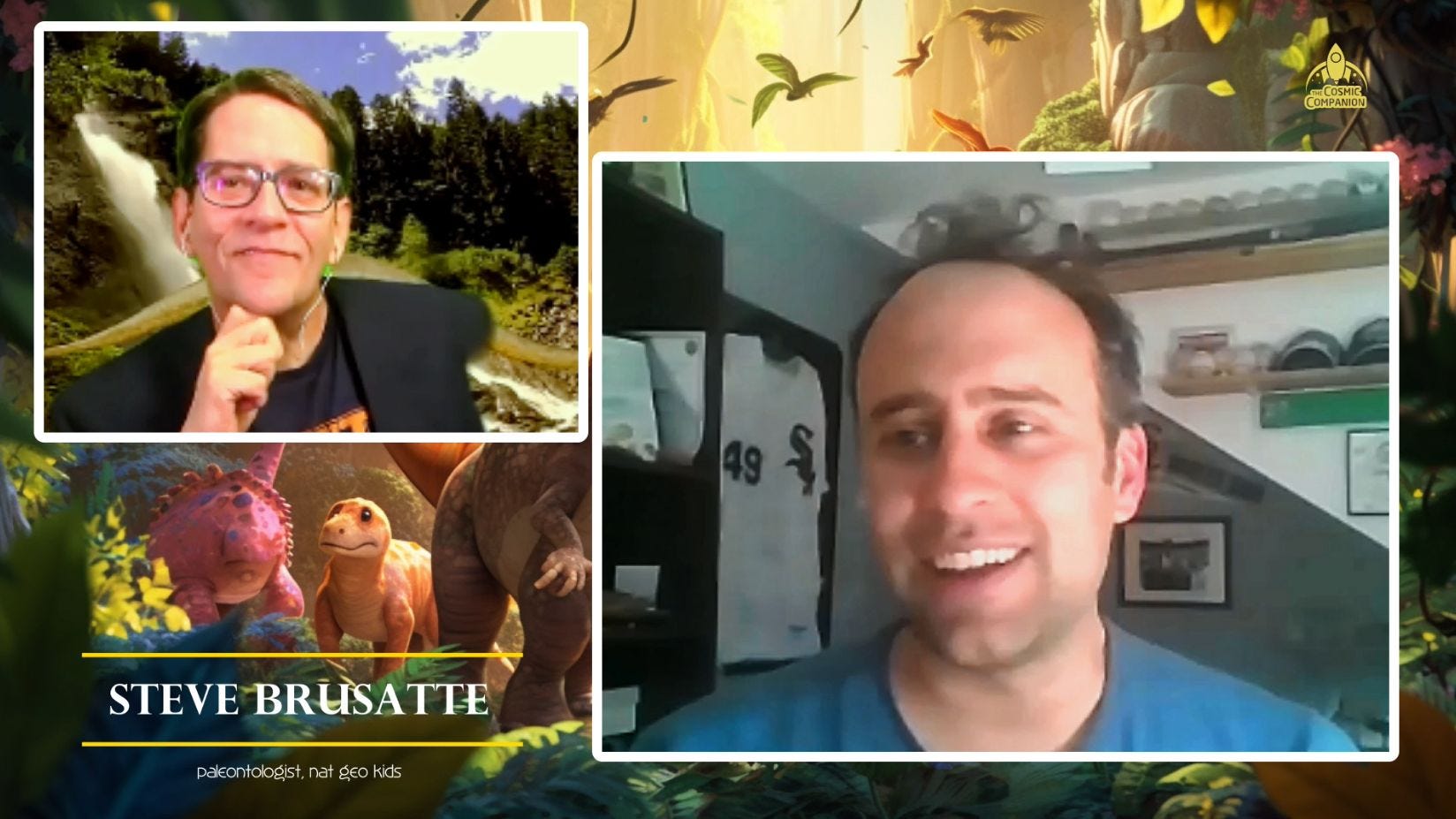

What would happen if the asteroid that ended the Age of Dinosaurs struck today? We are talking with Steve Brusatte, paleontologist with National Geographic and Get full access to The Cosmic Companion w/ James Maynard at thecosmiccompanion.substack.com/subscribe https://thecosmiccompanion.substack.com/subscribe?utm_medium=podcast&utm_campaign=CTA_4
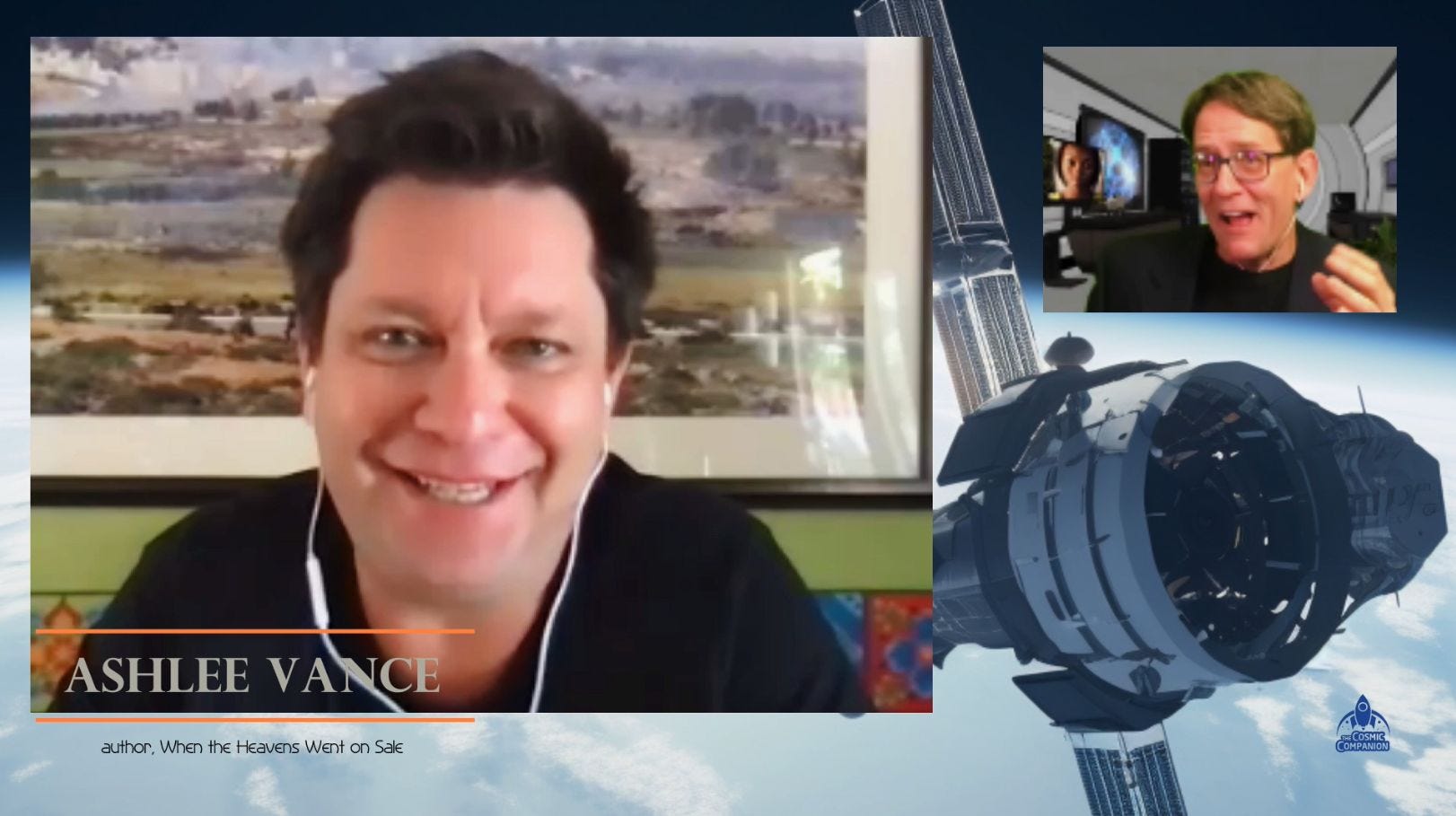

Hello everyone! This week on The Cosmic Companion, Artificial Intelligence Takes a Flight to Space, talking with Ashlee Vance, author of . The Cosmic Companion w/ James Maynard is a reader-supported publication. To receive new posts and support my work, consider becoming a free or paid subscriber. Get full access to The Cosmic Companion w/ James Maynard at thecosmiccompanion.substack.com/subscribe https://thecosmiccompanion.substack.com/subscribe?utm_medium=podcast&utm_campaign=CTA_4
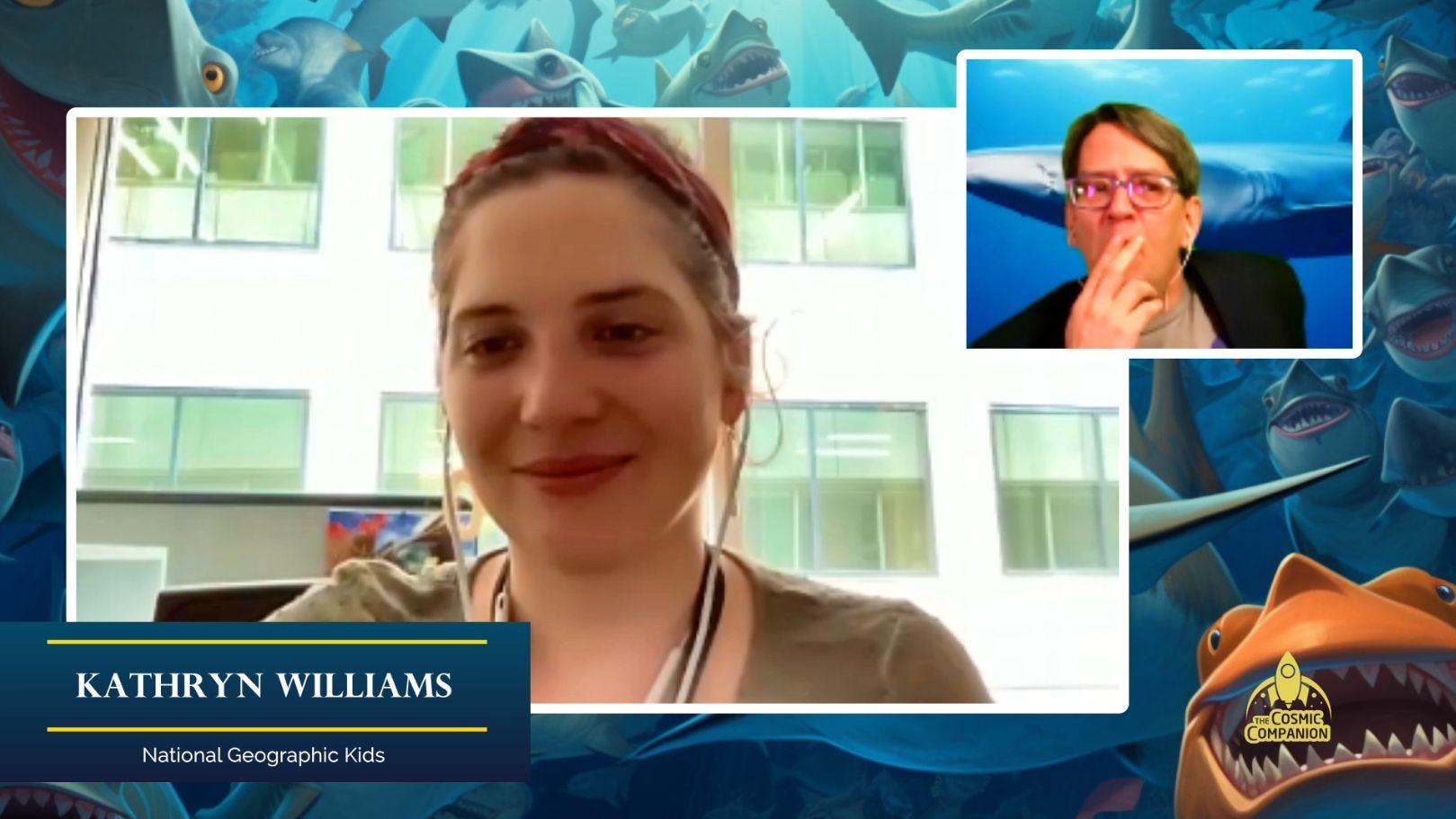

Which species are the greatest survivors? We talk about surviving extinction through the eyes of "The Masters of Survival" - tardigrades, horseshoe crabs, and sharks. We are joined by Kathryn Williams, editor of Weird but True! Sharks! from Nat Geo Kids! Get full access to The Cosmic Companion w/ James Maynard at thecosmiccompanion.substack.com/subscribe https://thecosmiccompanion.substack.com/subscribe?utm_medium=podcast&utm_campaign=CTA_4
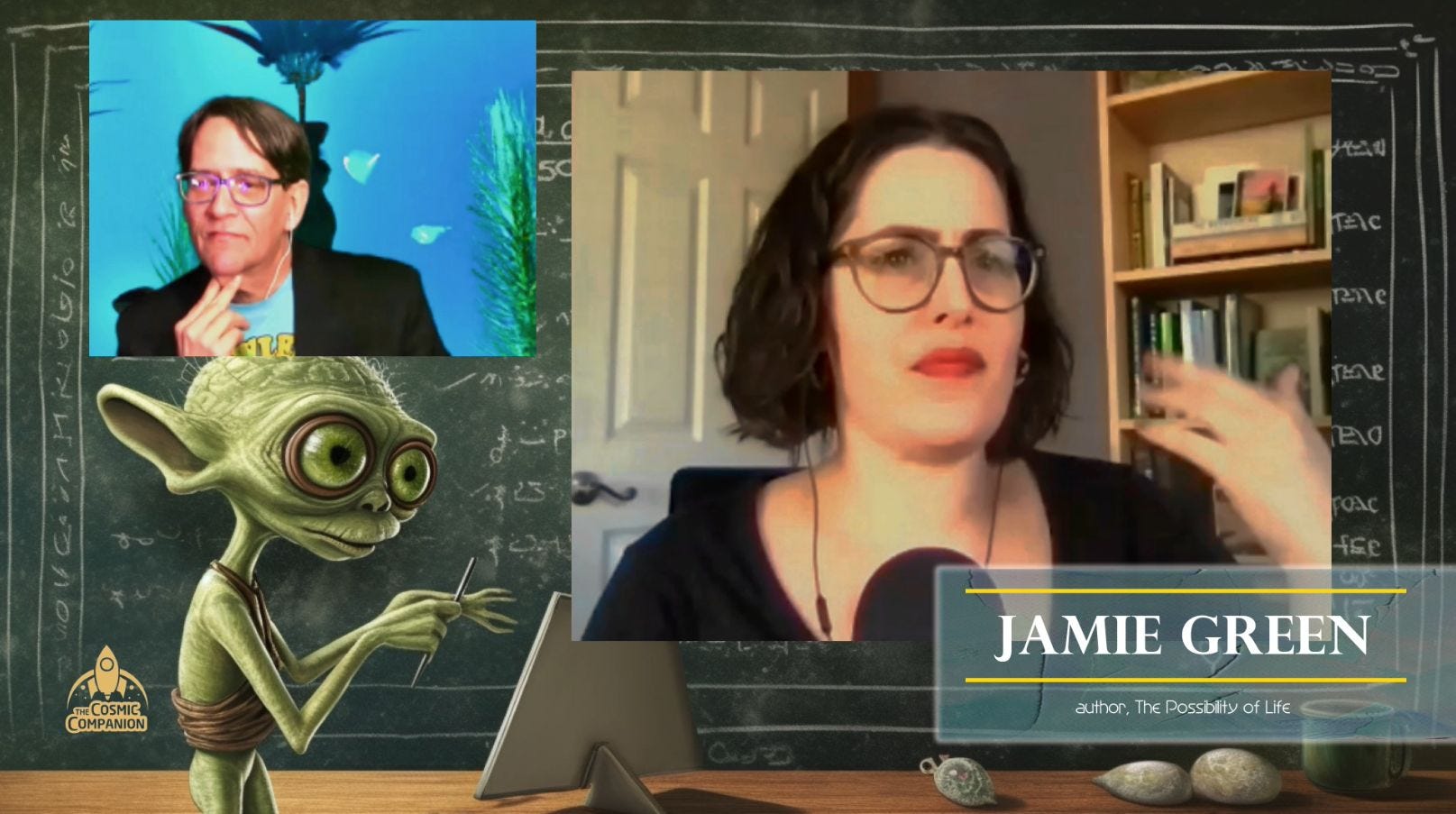

Hello everyone! This week, we are looking at . Later in the show, we will be talking with Jamie Green, author of the new book, . So, how does life form on a new planet? Chemicals and energy. That’s how. You know what else you can do with chemicals and energy? Cook food, that’s what! (Excuse me a minute while I put on this chef’s hat) Listen to the podcast here, or watch this episode as a video https://youtu.be/rPCFZ-gPGm8! If you are looking to cook up life on an early-career planet, here’s what you’ll need for this recipe: An abundance of amino acidsSome supply of sugarsA quantity of nucleotidesAt least a Little LipidsWater andenergy First, let’s talk about amino acids. These guys are the building blocks of proteins, which are essential for life as we know it. Vegetarian sources of amino acids include nuts, berries, beans, almonds, mint, or… [look around] oranges. Kind of like these tangerines right here. Look, we’re letting this sit in for primitive amino acids, let the orange thing slide. OK? The first amino acids may have formed through a process called “abiogenesis,” where simple organic compounds combine and react along with energy, such as lightning strikes or ultraviolet radiation from the sun. The molecules and structures within foods can change radically when they cook. [
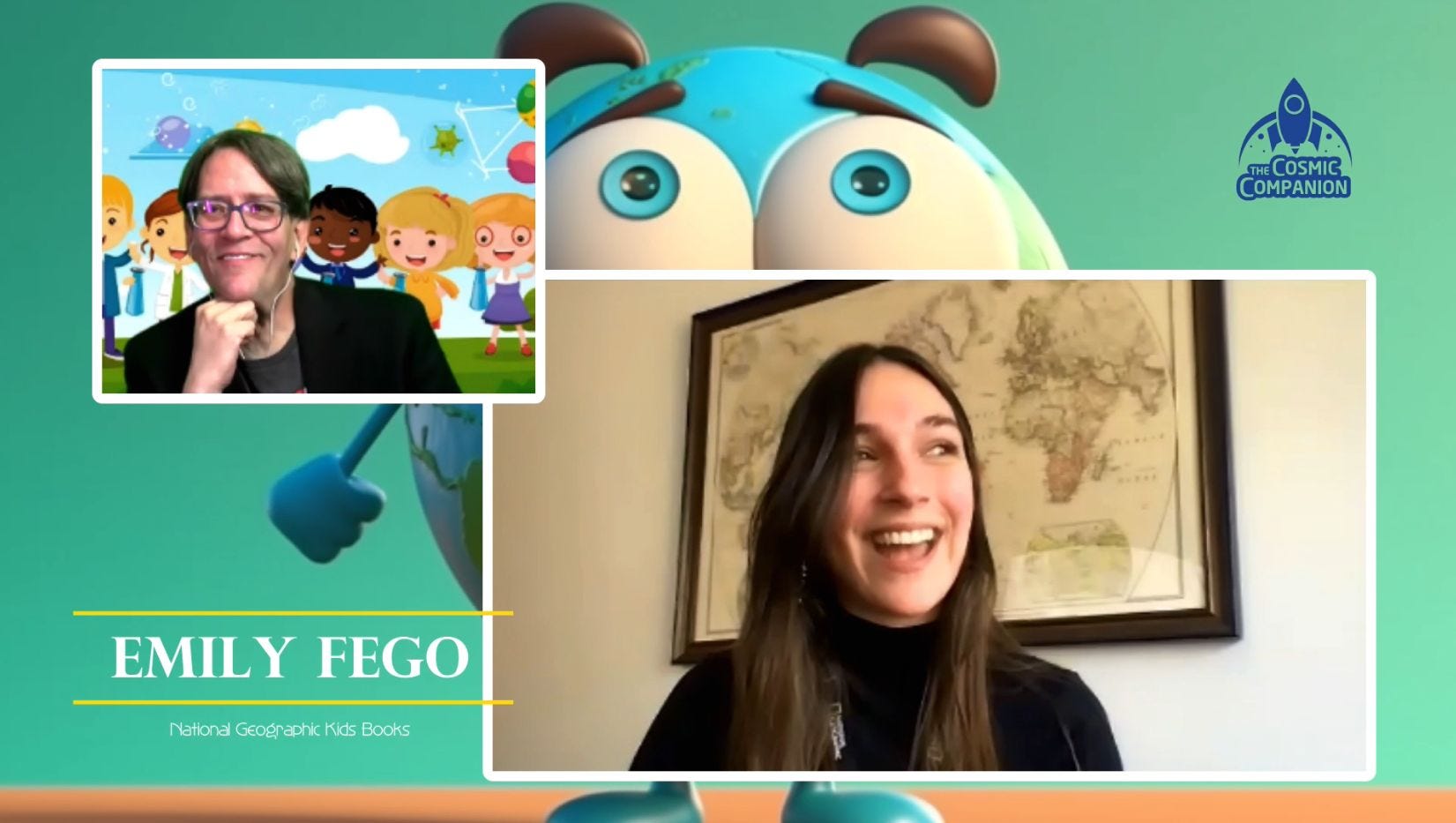

This week on The Cosmic Companion, we look at we live in, talking about some of the most bizarre objects in the Universe. Later on, we will be joined by Emily Fego from National Geographic, talking about Nat Geo’s new work, ! Now, you may think that things around your neighborhood are weird, but your oddball neighbor is just peanuts compared to what’s in outer space... Get full access to The Cosmic Companion w/ James Maynard at thecosmiccompanion.substack.com/subscribe https://thecosmiccompanion.substack.com/subscribe?utm_medium=podcast&utm_campaign=CTA_4
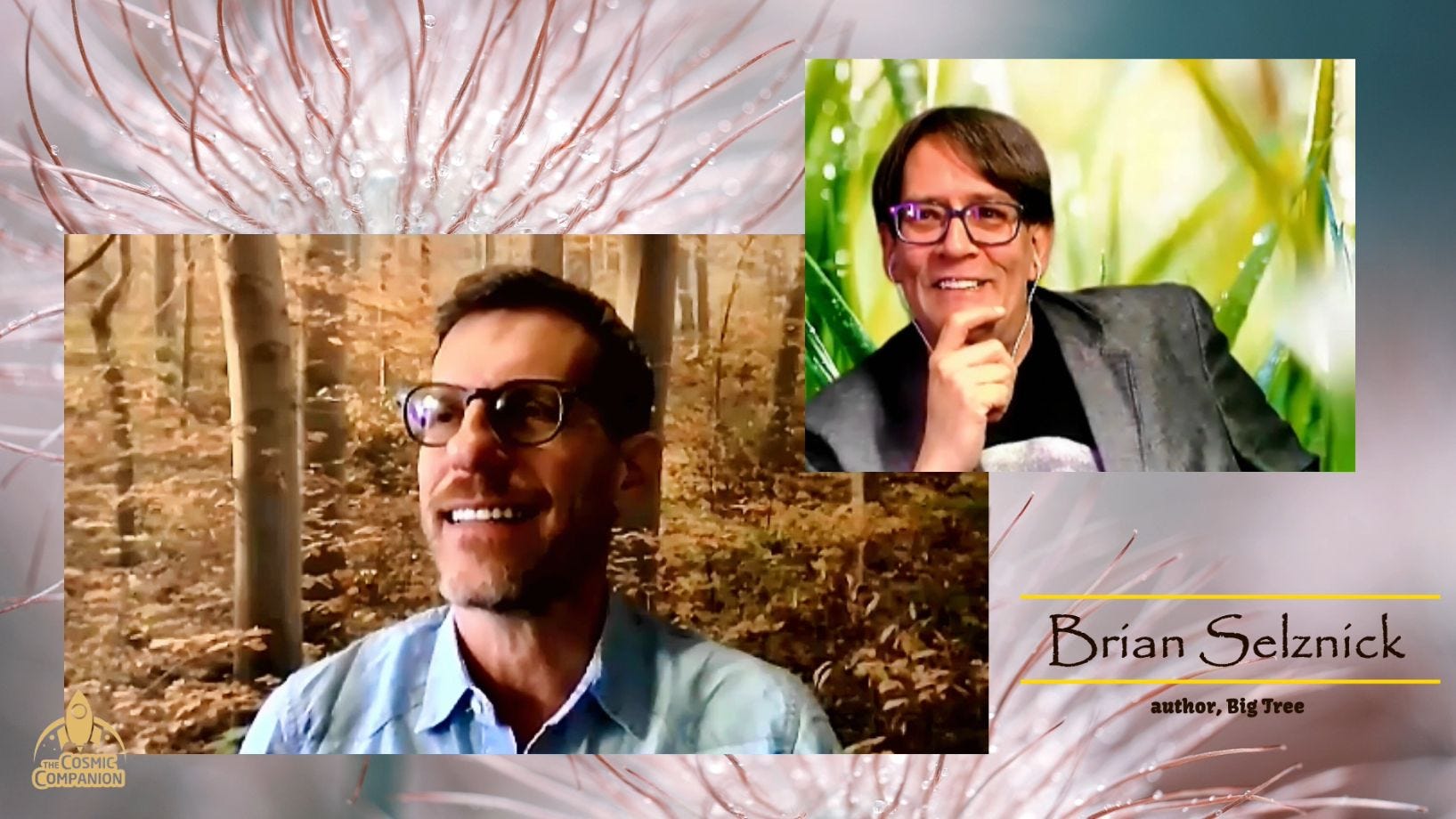

Hello everyone! Here’s our latest episode - w/ Brian Selznick, Author of ! NARRATOR: There are those who suggest that life on Earth began out there… Among the stars. Well, not the stars. Too bloody hot. Among the planets and asteroids, scattered throughout the Cosmos… With building blocks of life that may have been the forebearers of proteins, biopolymers, and peptides. Some believe there may still be the stuff of life floating around space searching for a planet or moon where they can, once again, ignite the process we call… life… Welcome back to The Cosmic Companion. I’m James Maynard. This week we are . This notion presents the idea that life on Earth — may have been delivered to our world — in whole or in part — by asteroids and comets. This same process could also spark life around the Universe... Get full access to The Cosmic Companion w/ James Maynard at thecosmiccompanion.substack.com/subscribe https://thecosmiccompanion.substack.com/subscribe?utm_medium=podcast&utm_campaign=CTA_4
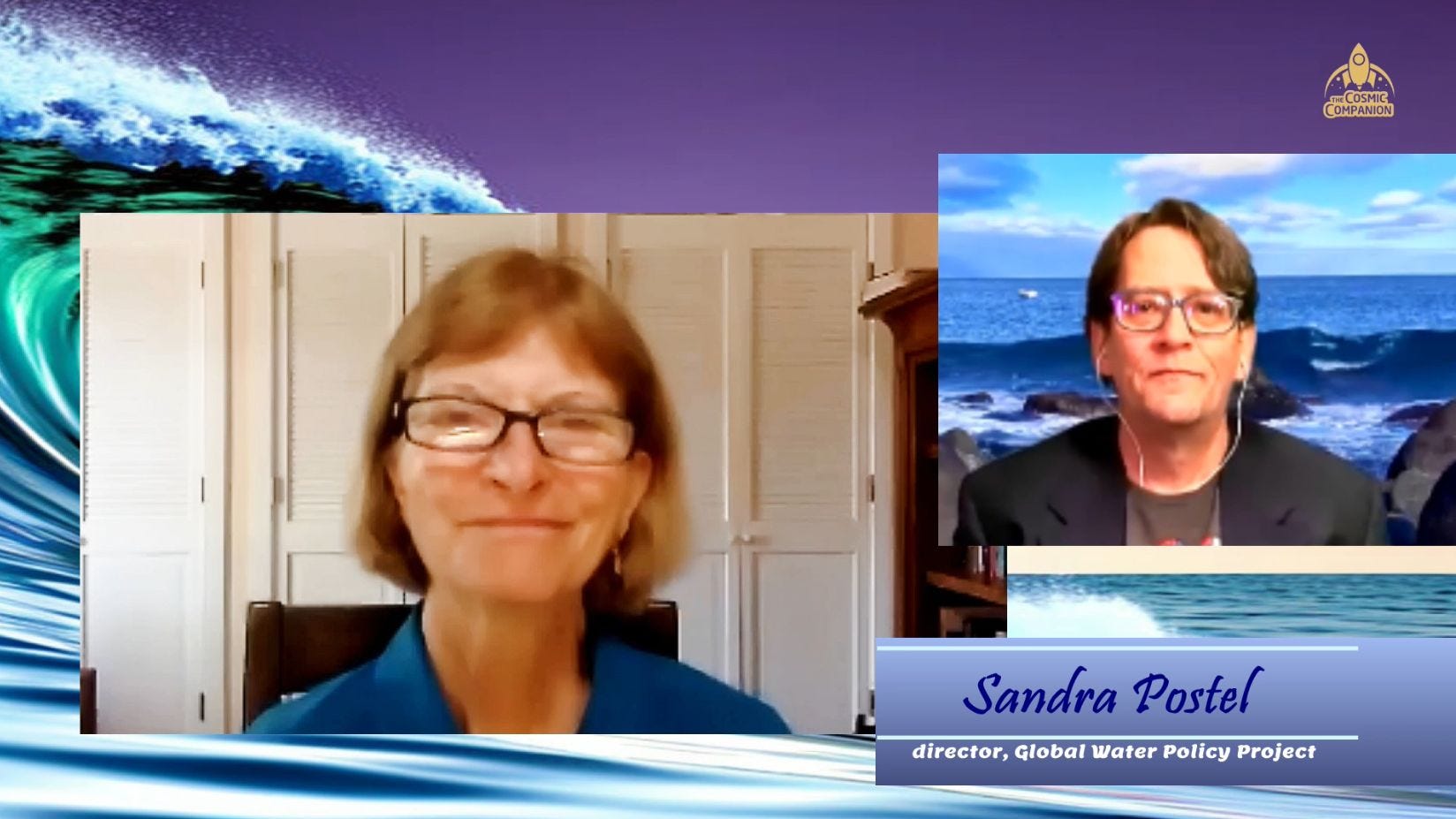

In the second part of our two-part Earth Day episode, , we’re exploring the vital role that water plays in sustaining life on Earth and beyond. Our special guest is none other than Sandra Postel, director of the Global Water Policy Project. She will share her insights with us into the importance of this precious resource. [[So. I’m sitting here on my bachelor pad, and you have me wondering. How did it all get here? The water, I mean. It seems Earth has an awful lot of it. I mean, blue planet, and all that rot.]] It turns out that no one is quite sure how or why water formed in such great quantities on Earth. Certainly, being at the right distance from the Sun, and having a thick atmosphere, allowing water to pool on its surface helps. But, how did water first arise on our world? Researchers have been puzzling over this question for years, and there are a few major ideas which have emerged. One theory is that water arrived on Earth through comets and asteroids. These space-borne clumps of rock and ice collided with our planet billions of years ago in large numbers, potentially bringing water with them. This theory is supported by the fact that the ratio of heavy to regular water on Earth is very similar to that found in comets, suggesting comets may have played a major role in forming the oceans of Earth. Another possibility is that water was present on Earth from the very beginning, during the formation of our planet. This theory suggests that water was present in the gas and dust cloud that eventually coalesced to form Earth. As the planet cooled and solidified, the water vapor condensed into liquid, forming oceans. [Cool water] A third theory is that water was created by the reactions that took place within the Earth’s mantle. This idea suggests that high pressures and temperatures within the mantle caused the formation of water molecules from the elements present in the layers of our nascent planet. And, it is also possible that each of these sources played a role in creating the aquatic environment of our water world. Today, water covers more than 70 percent of our planet, supporting millions of species of life. And, water around the planet, together with the life which depends on it, are threatened by global climate change, driven by human activity. Next up, we talk with Sandra Postel, director of the Global Water Policy Project. The Blue Marble on which we live is more than oceans, lakes, ponds and rivers. Water is also found in the atmosphere, aquifers, and life itself, including you and me. Heat from the Sun drives evaporation from oceans and other bodies of water, lifting water into the air. [wooooah!] Once in the atmosphere, this water vapor condenses into clouds, eventually releasing their moisture as precipitation, such as rain or snow, back onto the land and water. Moisture which falls onto land can either seep into the ground and become groundwater, or flow back into rivers, lakes, and oceans, restarting the cycle. The process is also influenced by factors like wind, temperature, and topography, which help determine the amount of precipitation that falls in different areas. This water cycle ensures that water is constantly moving and being redistributed throughout the planet, providing us with this essential resource that we all need to survive. [[Some desert plants only need water once every couple weeks under most conditions. Those ever-resilient tardigrades can last decades between drinks of water. And, some bacteria also use very little water, although their metabolism still depends on this vital liquid. The rest of us really need the stuff!]] There are several ways people can help conserve and protect this precious resource. Homeowners can seek out efficient appliances with the WaterSense label, and repair water leaks as soon as possible after they are discovered. Rainwater harvesting collects water which would have simply rolled off roofs, making it accessible for gardens and outdoor cleaning. Watering gardens during mornings and evenings reduces evaporation and water use. Shorter showers can also play a role in conserving water. Every little bit helps when we look to preserve the health of lifeforms on Earth. [[Water is more important? Not much. I’m Poseidon, so… I’m right.]] Next week on The Cosmic Companion, we will be — the idea that life here on Earth may have started from ingredients from space, delivered by comets and asteroids. We will be talking with Brian Selznick, the author of . Make sure to join us starting on 29 April, at TheCosmic Companion.net. Sign up for our newsletter at TheCosmic Companion.com and never miss an episode. If you enjoyed this episode of The Cosmic Companion, please tell your friends about the show, comment, share, you know the spiel. Clear skies! James The Cosmic Companion w/ James Maynard is a reader-supported publication. To receive new posts and support my work, consider becoming a free or paid subscriber. Start writing today. Use the button below to create your Substack and connect your publication with The Cosmic Companion w/ James Maynard Get full access to The Cosmic Companion w/ James Maynard at thecosmiccompanion.substack.com/subscribe https://thecosmiccompanion.substack.com/subscribe?utm_medium=podcast&utm_campaign=CTA_4
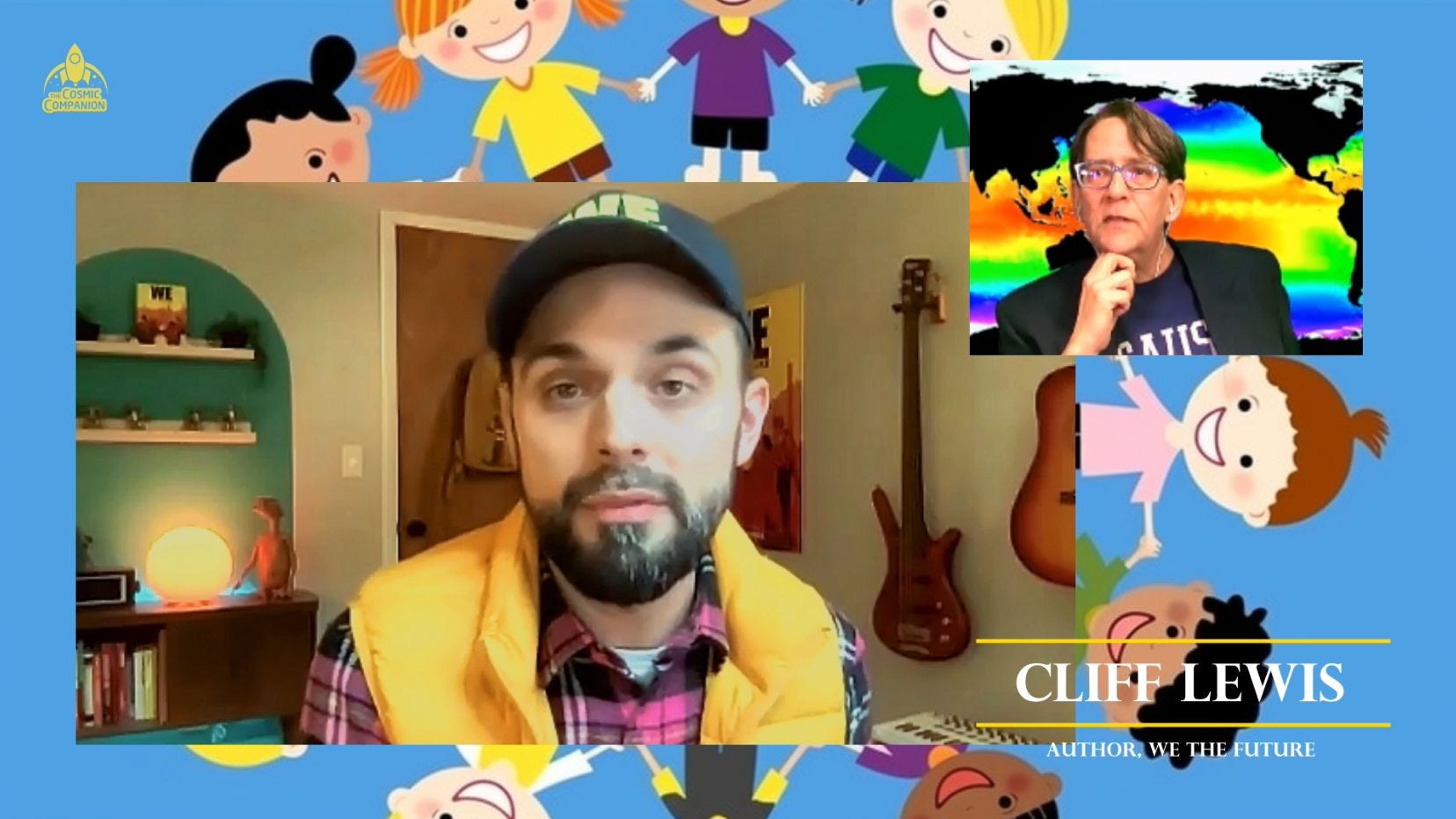

For Earth Day week, we bring you a look at ways young people can help save the planet! We’ll be talking with Cliff Lewis, author of We the Future! This week on The Cosmic Companion, we look at ways young people can help make Earth a better place to live. Later in the show, we’re going to be talking with Cliff Lewis, author of We the Future! [This episode is aimed toward young people, but there are plenty of lessons in here for everyone, so keep watching, regardless of your age.] {Thank you!} Since the start of the Industrial Revolution the Earth’s climate has been rapidly changing due to human activity, primarily the burning of fossil fuels such as coal, oil, and gas. In fact, it has been 46 years since our planet last experienced a year with cooler-than-normal temperatures. Now, I know you’ve heard the term “global warming” before, and you might think it just means that the Earth is getting a little warmer, no big deal. But here’s the thing: global warming is already resulting in some pretty serious problems. Listen to the podcast here, or watch the video version of this episode https://youtu.be/mSTLJEYQLfc! The production of greenhouse gases is causing the Earth’s temperature to increase, leading to rising sea levels, more frequent and intense natural disasters, and setting off a cascade of plant and animal extinctions. Rising temperatures are causing glaciers and ice caps to melt, which could mean more flooding, more intense storms, and the pollution of water supplies for large cities. [It’s too bloody hot!] Climate change is also resulting in more extreme weather, like heatwaves and droughts, which can harm crops and lead to food shortages. Ocean temperatures are also rising, driving deaths of coral reefs and a loss of biodiversity. But there is hope. We can take action to protect our planet and prevent the worst effects of climate change. We can reduce our carbon footprint by driving less, using renewable energy sources like solar and wind power, and eating a plant-based diet. [Did you know humans share about 98% of our DNA with pigs, compared to just 90% with cats and 82% with dogs? We even play video games! So… May I recommend a yummy fruit smoothie for breakfast?”] {Mmmm… Fruit smoothies!} Young people have the power to make a difference, advocating for policies prioritizing the health of the planet and supporting sustainable practices. You can speak out about the urgency of climate change and encourage others to take action by your own example, striving toward a more Earth-friendly lifestyle. Next up, we talk with Cliff Lewis about his new book, ! So, here’s the good news: we can do something to reduce our carbon footprint. When you need to travel, consider having fun and getting some exercise by walking or biking whenever possible. Or take public transportation instead of driving a car. Young people can also talk to your parents about the benefits of driving an electric or hybrid vehicle. In addition, household solar panels and rainwater harvesting reduces demand on utilities, decreasing our use of fossil fuels significantly. This can save a significant amount of money on your home’s electricity bill! Another important thing nearly all of us can do is to recycle! Some other ideas are to reduce waste by using reusable water bottles, lunch containers, and bags. Some people will downplay the effects of personal choices in protecting the environment. And, although it is true that large industries create vast amounts of the environmental pollution, consumers have the power to make them change. Large unscrupulous corporations [EVIL LAUGH] do the damage they do for one reason — to make money. As consumers, we have the power to support alternatives to environmentally damaging products and practices. We can choose to buy products that are made sustainably and reduce harm to the environment. We can support companies that prioritize reducing their carbon footprint and investing in renewable energy. If enough of us make these choices, we can have a real positive impact on the environment. We can show companies that there is a demand for environmentally-friendly products and practices, pushing them to make changes to their products and policies. Finally, get involved in your communities! Join a local environmental group, attend climate rallies and marches, and make sure you’re educating yourself and others about these issues. As life springs to, well, life, around us this season, let’s celebrate the plants and animals and fungi and other beings around us by doing what we can to help save our planet for future generations. [[We can all plant the seeds for future generations. Don’t leave it for others to do. We all need to be pollen in the same direction. Let us get to the root of the…]] Next week on The Cosmic Companion, we have a special guest for Earth Day! We welcome Sandra Postel, director of the Global Water Policy Project to the show. [[Greetings, mortals. I’m Poseidon, Greek god of the sea. I’m also god of Earthquakes. And, for some strange reason, horses. I’m basically a walking Jim Morrison poem. Ahem. I assure you that water is one of the most precious resources on the planet. On Earth Day, The Cosmic Companion asks the question, “Water is More Important!?” Answer? Not much. Dive on in with us starting on Earth Day, 22 April.]] If you enjoyed this episode of The Cosmic Companion, feel free to comment, share, and tell your friends about the show. It might just help the planet! Clear skies! James The Cosmic Companion w/ James Maynard is a reader-supported publication. To receive new posts and support my work, consider becoming a free or paid subscriber. Start writing today. Use the button below to create your Substack and connect your publication with The Cosmic Companion w/ James Maynard Get full access to The Cosmic Companion w/ James Maynard at thecosmiccompanion.substack.com/subscribe https://thecosmiccompanion.substack.com/subscribe?utm_medium=podcast&utm_campaign=CTA_4
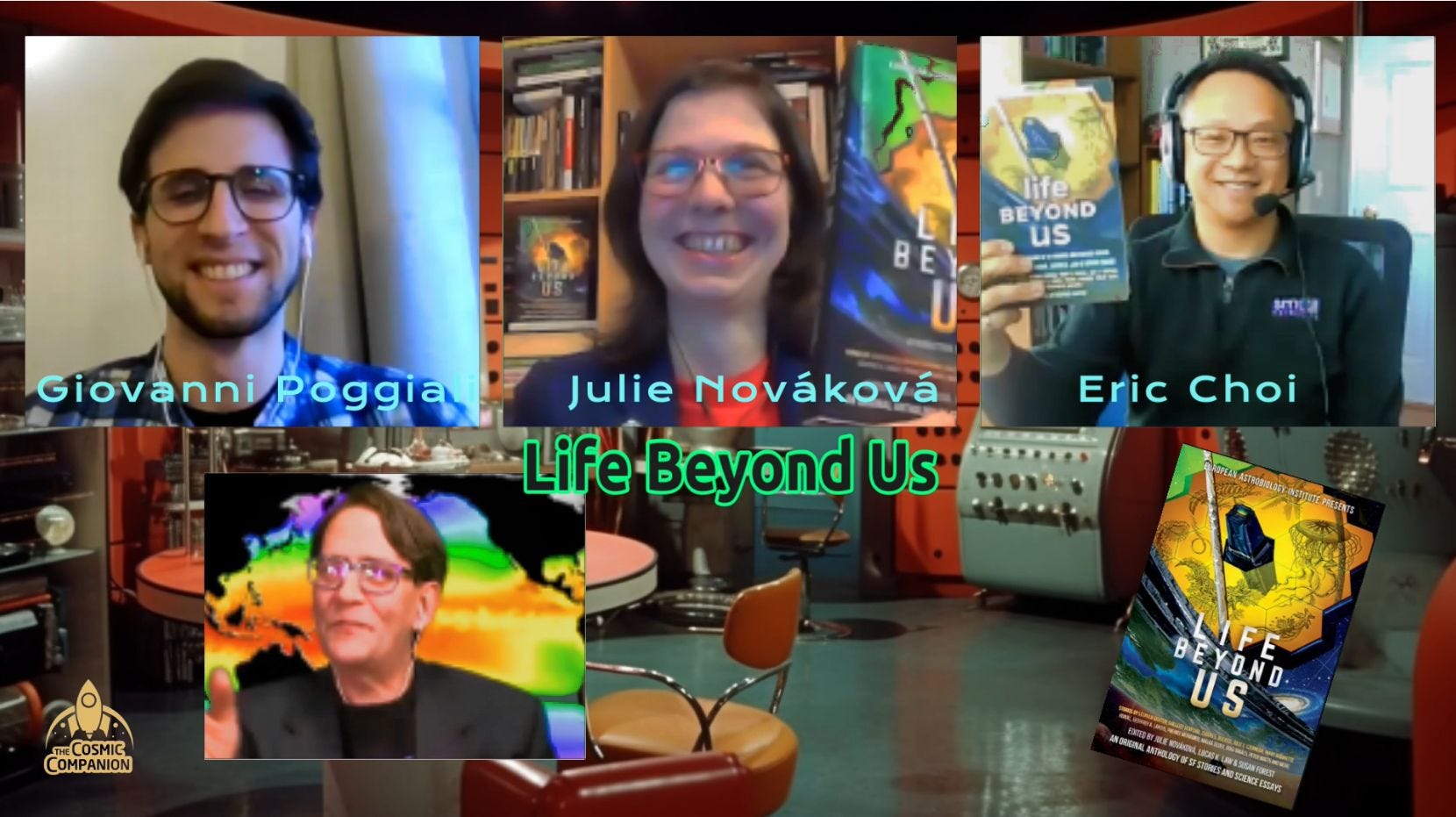

For Easter week, as most people share fables of giant anthropomorphic rabbits distributing chocolate eggs, we are . Later in the show, we will welcome Julie Nováková, Giovanni Poggiali, and Eric Choi to the show, talking about their new anthology, . The idea of alien life has fascinated us for centuries. While science fiction has often portrayed extraterrestrial beings as having advanced intelligence, strange abilities, and/or a thirst for human flesh, the scientific reality is likely somewhat different. So, let’s buckle up and take a journey through the fictional and scientific world of extraterrestrial life, shall we? Get full access to The Cosmic Companion w/ James Maynard at thecosmiccompanion.substack.com/subscribe https://thecosmiccompanion.substack.com/subscribe?utm_medium=podcast&utm_campaign=CTA_4
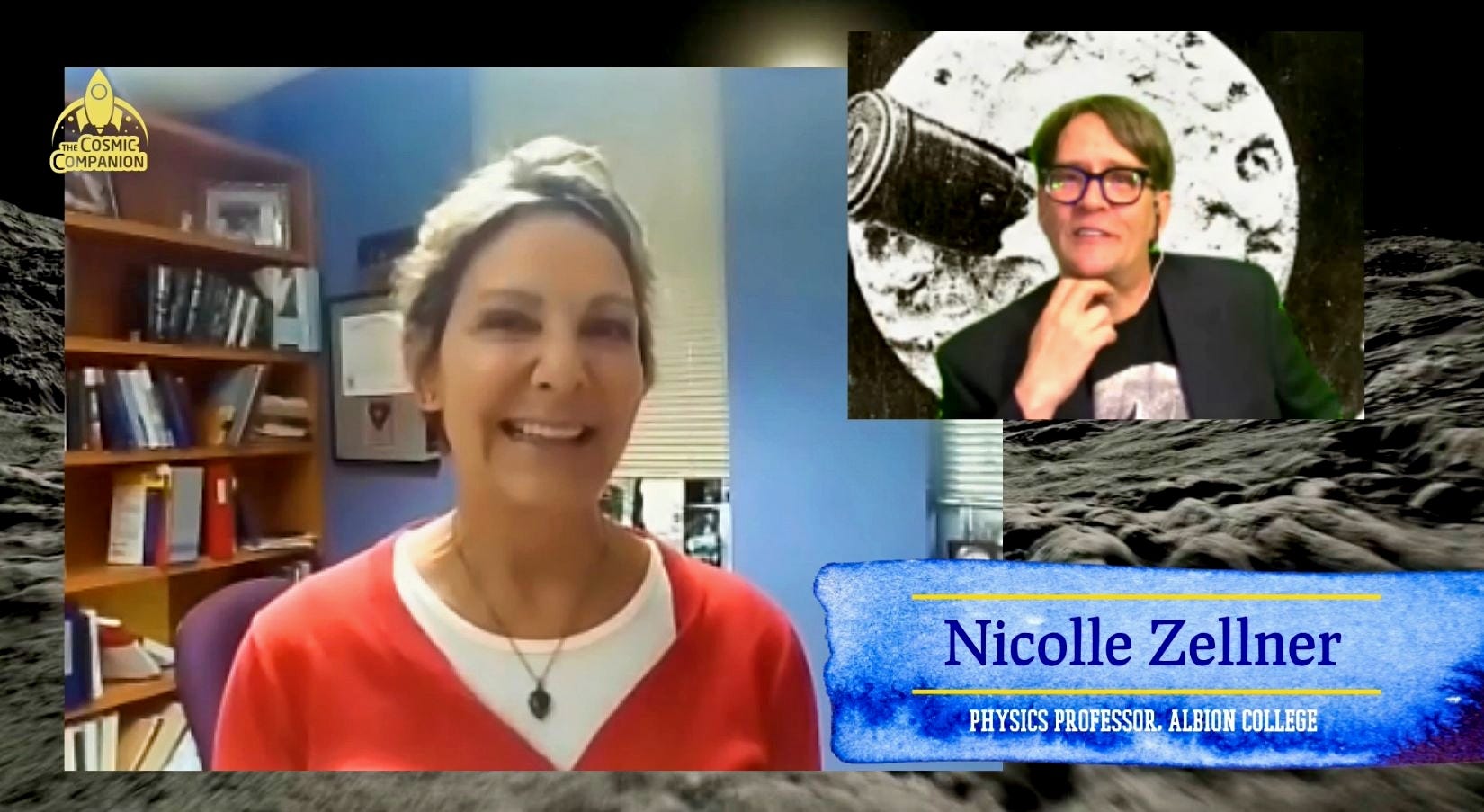

This April Fool's Day, we are bringing you . No kidding! Later on, we will be joined by Albion College physics professor Nicolle Zellner to discuss her research on planetary impacts in our Solar System. Throughout history, many cultures had myths and legends about the Moon, although they did not have a real scientific understanding of its composition. Some people believed it was made of a metal like silver, while others held to the belief the Moon was a god or goddess... Get full access to The Cosmic Companion w/ James Maynard at thecosmiccompanion.substack.com/subscribe https://thecosmiccompanion.substack.com/subscribe?utm_medium=podcast&utm_campaign=CTA_4
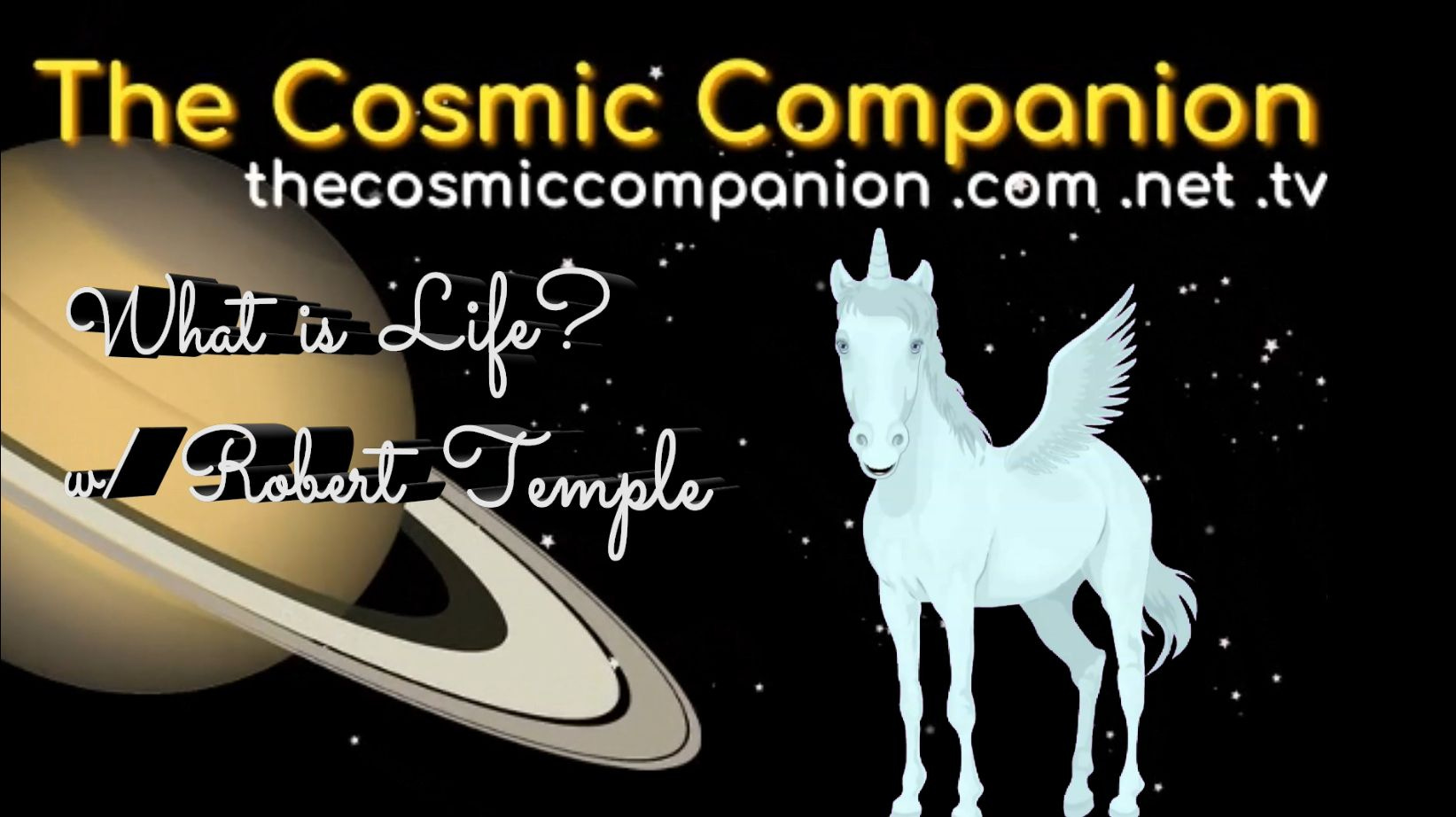

This week on The Cosmic Companion, we're delving into one of the most profound questions in the Universe: What is Life? Later in the show, we will be talking with Robert Temple, author of A New Science of Heaven. Get full access to The Cosmic Companion w/ James Maynard at thecosmiccompanion.substack.com/subscribe https://thecosmiccompanion.substack.com/subscribe?utm_medium=podcast&utm_campaign=CTA_4